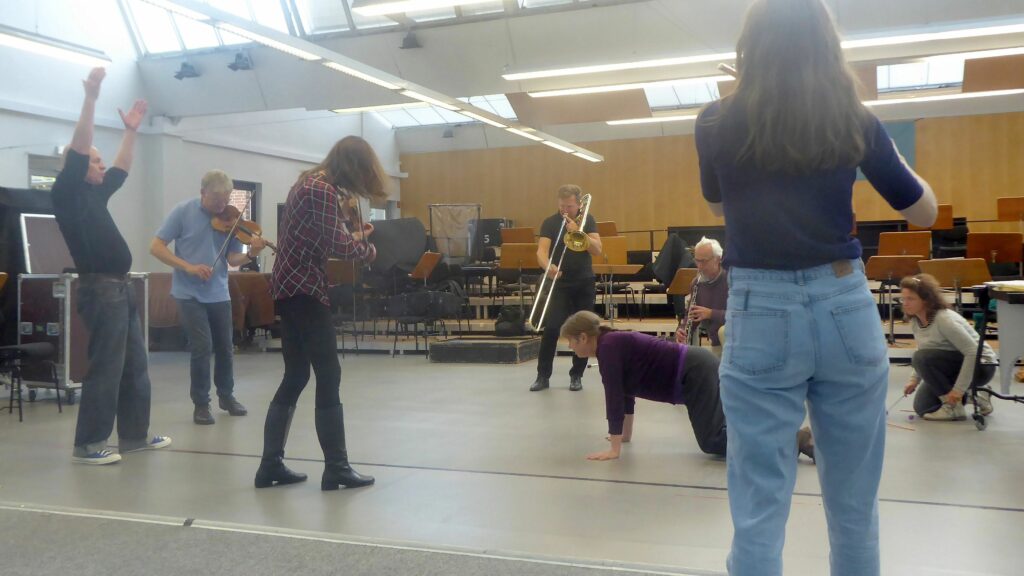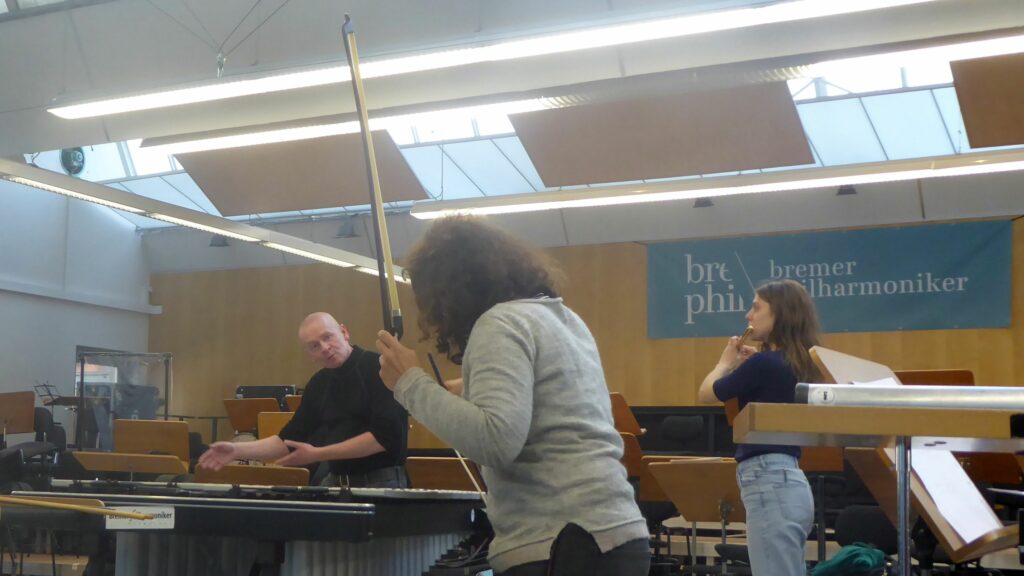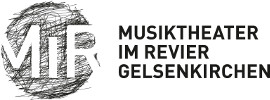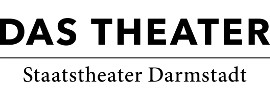In many cases, theatre today sees itself as an autonomous art that is not primarily subject to the interpretation of the work. Even music theatre work is often not preceded by a finished score or text. Theatre rehearsals begin with an open-ended approach, serving the process of a joint development of musical, textual and scenic material, which only takes on its final form as the work progresses. To support appropriate process-oriented work, the feXm offers its project teams the option of dividing their work into different rehearsal phases. Each team chooses its own path.
10.02.24 – Musiktheater im Revier Gelsenkirchen: Premiere “Freedom Collective”
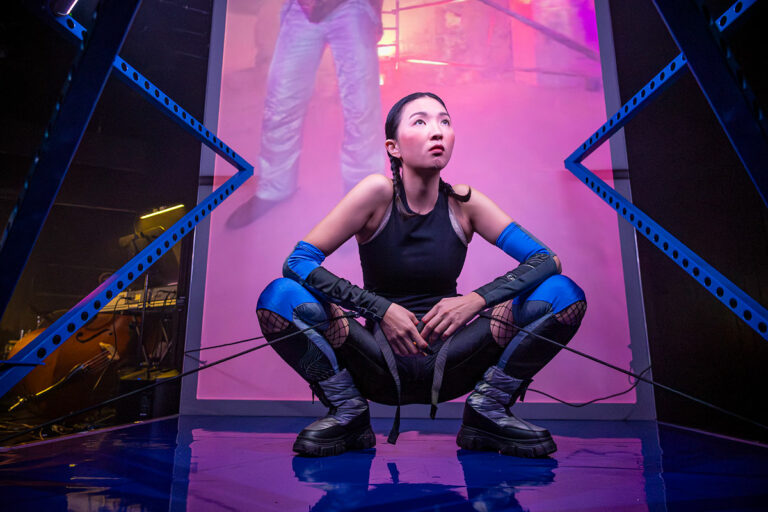
Nayun Lea Kim not in the role of the "Fan", but in the role of the gamer of the "Fan" avatar. Photo: Sascha Kreklau
Successful premiere of “Freedom Collective” at the MiR. Where have we got to from my point of view?
Davor Vincze’s score is certainly the most challenging that the theatres have ever had to deal with as part of NOperas! Fears that the agreed number of orchestral rehearsals would not be enough were not realised at the MiR: Premil Petrović – as musical director from out of town and also part of the project team – was impressed by the commitment and virtuosity of the Gelsenkirchen musicians after the very first rehearsal. He was equally full of praise for the perfectly cast quartet of four singer-actors. And hats off to the MiR’s sound department for the seamless spatialisation of the sound and for the perfect amalgamation of live musical events and electronic playback.
Davor Vincze has also written by far the most “operatic” NOperas! score to date, including, one is amazed, a love duet that is hardly inferior to Der Rosenkavalier in terms of culinary delights. Pathos and beautiful sound, which for a long time were definitive “no-nos” for composers who did not want to chum up to the music theatre business, are finding new honours. But every sound remains advanced. His music never falls back into the epigonal or harmlessly eclectic. Where is the difference between the real and the unreal, between statement and irony and quotation? I am still struggling with it.
Now, the name of the NOperas! programme includes the word “not” alongside “opera” – it is intended to be about projects that also break new theatrical ground. Projects that, in whatever way, go beyond the traditional narrative of the opera genre. When awarding the project, the jury expected this above all from the concept of using smartphones to involve the audience in the musical theatre experience. In most people’s opinion, this was only partially realised, at least in this first stage of the project at the MiR. For some, their browser got in the way. Those who were “connected” instead hardly experienced anything additional in terms of substance. One woman I spoke to, who must have been barely thirty, even reacted allergically: “I’m going to the theatre to finally get away from this thing, but even here everyone is fiddling with their mobile phones now!” If this complaint is essentially also directed at the NOperas! jury, then the demands to involve the audience as actors in the theatre events already had to be scaled back in the end with “Chaosmos”, the first NOperas! production. The idea of gamifying musical theatre is currently on the minds of many. Rarely have I seen this goal achieved in a convincing way. But Bremen and Darmstadt are still waiting here.
The fact that even the first development stage of “Freedom Collective” fulfils the claim of NOperas! is due to Heinrich Horwitz’s approach of not telling stories in the conventional way. The audience is not tied to seats. Fuzzy Edges separates the stage and, as it used to be called, the “auditorium”. The art form is not that of an opera. It is that of an environment of light, sound and rather symbolically withdrawn theatre action. A meta-level does the trick: the four performers do not embody characters in the play, they are players who lead these characters as avatars. But it is a game, even if it is primarily narrated. Nonetheless, the audience should remain active. Vincze’s score provides support by – a key moment – breaking out of the operatic idiom into electronic dancefloor sounds for an extended period in the middle of the piece. Some let themselves be carried away by the ensemble as animators to rave. Others seemed rather irritated, at least on this premiere evening, barely overcoming their inhibitions about desecrating the MiR’s opera temple in the desired manner.
The evening was sold out and the average age was a good half that of normal opera evenings. A striking example of the fact that music theatre needs new forms and probably also new formats if it wants to reach younger audiences in future. Most of them simply gave in to the pleasure of “media overkill” (Deutsche Bühne). Provided they had realised that the sung text often refers to drugs, they experienced an intoxicating evening even without them. Vincze’s music, however, tells a story with many plot twists at every moment: Who fights whom, who loves, who betrays whom, what happens to whom and why? Others’ eyes are glued to the surtitles, which unintentionally re-establish the usual separation between stage and auditorium, theatre and audience. You try to decipher plot conflicts that are not important to the scene, get stranded in the process and end up feeling fooled.
Rarely have I heard such different voices as after this premiere. It achieved something decisive when it led to such lively discussions. As a NOperas! project, I feel that “Freedom Collective” lives essentially from the deliberate dialectic between Vincze’s revival of genuine operatic drama and Horwitz’s theatrical post-drama. The latter has so far retained the upper hand.
04.01-12.01.2024: Stralsund – work on OPER OTZE AXT
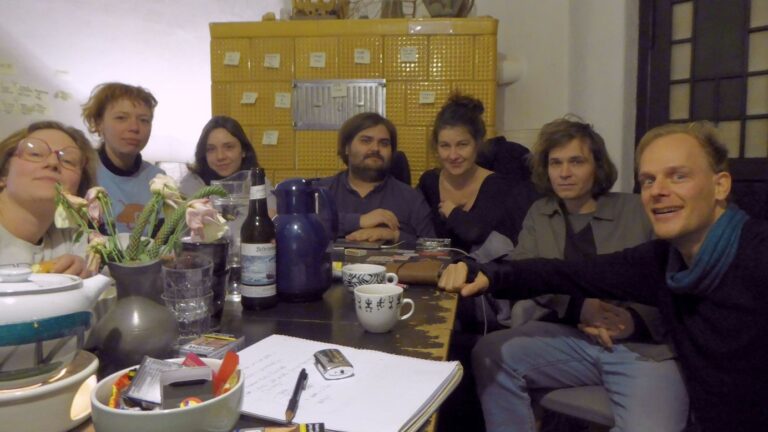
The almost complete Dritte Degeneration Ost in Stralsund (only Richard Grimm, the composer, is missing). From left to right: Romy Dins, Antonia Beeskow, Anne Bickert, Frithjof Gawenda, Frieda Gawenda, Laurenz Raschke, Mathias Baresel (Photo: Roland Quitt)
The new year begins for Dritte Generation Ost with an intensive working retreat at OPER OTZE AXT in Stralsund. Three of the eight come from there, the mother of the two Gawendas gives up her flat and it becomes a NOperas! flat share for a week.
One week of hard work. The daily schedule is rigorously organised. In the mornings, the team splits into smaller groups to work separately on individual areas – libretto, stage, music – and bring them back together in the evening in a plenary session. Additional funding organisations apart from feXm are also researched; the plan is for the project to continue to develop after the end of its three NOperas! phases and to be able to find additional performances, especially in the East.
During the last two working days, I join the feXm as dramaturge. Outside it’s freezing cold and the sky is bright blue, in the Gawenda flat there are overflowing ashtrays and thick clouds of tobacco.
A number of fundamental ideas have emerged during these days.
OPER OTZE AXT is roughly based on the real life story of Dieter “Otze” Ehrlich. It should remain inspired by his story. It should remain inspired by Ehrlich’s story without retelling it in detail and without laying claim to historical truth. Under no circumstances should it follow in the footsteps of the well-written personality musicals à la Lindenberg, Bowie or Abba.
Basic stages: Otze as a non-conformist, his rebellion, his conflict with state power and his secret pact with it when he becomes an informer for the Stasi. Otze then in the united Federal Republic of Germany: he slips into drugs, he kills his father.
Somewhere hidden in this story are questions about the relationship between the GDR and the new unified Germany. About the so-called “Wende” years, about the punk movement in East and West. And, of course, questions about the concept and idea of freedom. “Break what breaks you!” sang Ton, Steine, Scherben at the time. “Why don’t you break yourself!” was the title of a song by Dieter Ehrlich.
Although DDO has an equal number of male and female members, these two days are all about the male world. Of tough guys who get into heroic fights and get drunk, conspiratorially building their amplifiers somewhere to shout out their frustration in the closed-off world of the punk community.
Three protagonists emerge: Otze, his father and the collective of a many-faced and therefore all the more faceless conformist outside world – as character masks and voice leaders of the “Germany” system (first East, then East-West), individual figures can emerge from it, only to immediately fall back into it again. In any case, women do not seem to play a decisive role in Othete’s world. To be Oedipus, Otze has so far lacked Iocaste.
How does music theatre that refers to punk go together with classically trained opera voices and the instruments of a classical orchestra?
The key figure should be that of the father, conceived as a person who is always present but always silent. He is surrounded by the absence of sound. Silence is one of the most powerful means of musical expression at the moment of the general pause. Rebellion through noise and sound, on the other hand, characterises the son. While he cries out in vain for dialogue with his father, both are speechless in their own way. The idiom of the opera is then parodically set against them both as that of a West-Eastern petty bourgeoisie trapped in musical clichés.
It is above all this musical dramaturgy that has so far provided a more precise interpretation of the Otze parable. A play, therefore, about the speechlessness of an all-German society. A play also about the changed continuation of the parental conflict of 1968 into the 1980s.
While the revolt of the 1960s was as optimistic in its belief in the possibility of a better life as it was saturated with language and theory, after the collapse of all this hope, after the end of the Prague Spring in the East, the RAF and the Red Brigades in the West in the later Honecker era, which was also the era of Kohl, Reagan and Thatcher, all that remained was the language- and theory-less feeling of a last dance on the Titanic. In “contemporary music”, all binding systems disintegrated during this period. Pop is indulging in gloomy, plaintive songs. Punk cries out against the world without being able or even wanting to show a better one. Only the Gorbi shouts put an end to the general feeling of no future. But in Kohl’s blossoming landscape, the AfD is thriving today.
09.10.2023 – Wuppertal: The new feXm project is called “Oper Otze Axt”
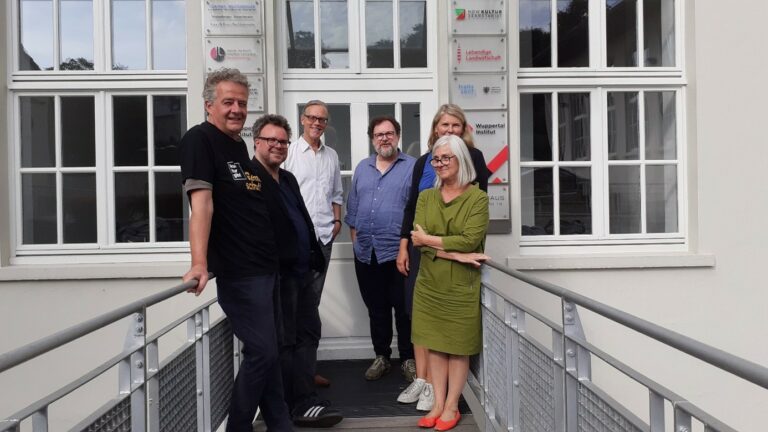
At the NRW KULTURsekretariat in Wuppertal: almost the entire feXm jury this year. From left to right: Christian Esch (feXm), Søren Schuhmacher (Darmstadt), Rainer Nonnenmann (external juror), Michael Schulz (Gelsenkirchen), Kirsten Uttendorf (background; common voice with S. Schuhmacher), Brigitte Heusinger (Bremen). Not to be seen: Moritz Lobeck as another external juror, who could only be connected via Zoom. © Roland Quitt
Two jury meetings are needed to decide on the next NOperas! project based on the applications. As always, a group of finalists was selected in the first session, who then had a month to contact the participating theatres, ask more detailed questions about the opportunities available there, and concretise their own plans in more detail, in order to then face each other face-to-face in a more in-depth discussion in the second session.
As is almost always the case, this time the decision remained difficult until the last moment. “Oper Otze Axt” is the name of the project that won the race. The collective responsible for the production is called “Dritte Degeneration Ost”.
“Oper Otze Axt” is inspired by the life of Erfurt punk musician Dieter “Otze” Ehrlich and his band “Schleimkeim”, which was part of the musical underground of the GDR. The team convinced the jury, among other things, by placing its particular view of the German-German problem against the backdrop of the reunification years, provocatively generalising the question of the nature of freedom beyond this context and thus making an intelligent thematic contribution to pressing contemporary issues within the framework of musical theatre.
“Dritte Degeneration Ost” is not only the largest collective (eight people share artistic responsibility), but also the youngest to be awarded the feXm contract. The name satirises the attempts to come to terms with German-German history by the “Dritte Generation Ost” (Third Generation East) network and association. Almost all of the team come from the “new federal states” and link their project to coming to terms with their personal experiences. But even more than the “Third Generation”, the “Third Degeneration” belongs to the post-reunification period, looking at the time from the perspective of an experience that is still close enough to be of personal interest, but distant enough to create a new historical perspective.
28.09.2023 – Gelsenkirchen: Mock up set rehearsal
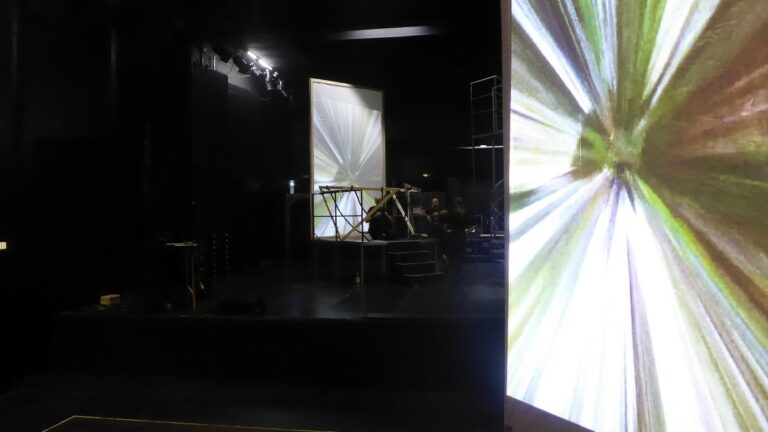
Screens with techno thunderstorms at the "Freedom Collective" mock up set rehearsal © Roland Quitt
The word “reality” is replaced by “realities” in the play description written by the team. There is no longer just one. More or less assuming that it is hopeless or perhaps simply no longer a question of separating the true from the false in the conventional way, of recognising the idea of multiple realities.
Each person should experience their own piece in this “immersive” music theatre. Everyone should be able to move freely through the theatre in a space that is both stage and auditorium at the same time, thus eliminating their conventional separation.
Everyone should drift between different interpretations of the plot, none of which is more correct than the other.
Immersion, however, proves to be a difficult exercise when it comes to musical theatre with highly complex music and a correspondingly traditional orchestral set-up. The rehearsal in Gelsenkirchen was also aimed at solving such problems. The spaces in the three participating theatres are different. Magdalena Emmerig has created flexible room elements that can be adapted to the respective circumstances. The opera directors and technical departments of all the theatres involved had travelled to Gelsenkirchen. For them, Gelsenkirchen also became a kind of test case. Would it be possible to find solutions here that would bring everything under one roof for them too?
Screens dominate our lives for years. Corona has multiplied the trend: Zoom conferences have taken the place of city trips or even travel, Netflix has replaced theatre visits, virtual sex in 3D has replaced real contact tracing. Theatre is a space of physicality. Screens will also define “Freedom Collective” – large ones in the auditorium, small ones on the mobile phones involved in the performance. But visitors will become co-actors. They will not only have to move around the space, but will also be challenged to perform their own “physical” actions on their mobile phones and ultimately experience a split world of feeds (also on a musical level) and live events.
The sound technology involved – the famous SWR experimental studio, without which the works of Luigi Nono, among others, would not have been possible – will probably not always make it possible to recognise which sound is coming from where. All the more, however, it seems to be about the tension between what is mediated and what is experienced as “live”.
So aren’t there perhaps criteria by which we can filter the jumble of divergent “experiences of reality”?
02.06./16.06 2023 – Fundstadt in Bremen and Gelsenkirchen
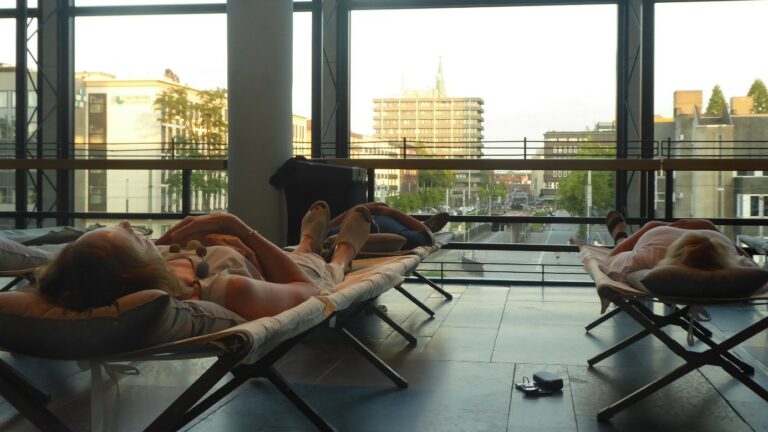
Ende der Gelsenkirchener Fundstadt-Aufführung: Kinderstimmen und klangliche Reminiszensen driften durchs Foyer (© Roland Quitt)
2 June: Premiere of “Fundstadt” in Bremen / 16 June: Premiere in Gelsenkirchen. The reviewer of the Bremer Kreiszeitung describes the performance as “magical”. Fundstadt’s claim to “let us see the world through a child’s eyes”, he says, initially seems “a bit kitschy”. One of its greatest assets is that it has escaped all kitsch. Just as the team met the children involved at eye level, so now does the audience. The “beings” that the six children invented for themselves as companions appear threatened in quite a few cases. “They want to break you” says Ali to his, which he hides in a shoe box. He promises him to protect it. “The truth is not always the most beautiful” speaks the voice of a girl from Bremen from offstage (most of the time she is downright “disgusting”). She wants to become a veterinarian. But what if an animal got into trouble and a friend needed her help at the same time? There would then be no right thing to do. So she has decided to do without friends in her life. Salvation is not one of these children’s worlds.
Where sound does not oppose the visual in music theatre, it runs the risk of becoming bogged down in the subconscious. The six films do not escape this either. In front of the film image, the music liquefies into a soundtrack in places, although it deserves to be heard more consciously. The live actions, created by children and instrumentalists, compensate for this. Their visual and sound memory motifs bring back the images and sounds of the film.
The six filmic portraits of children remain the same in both cities. Three in each city link directly to the place where they are seen. The live actions differ only slightly as such in both cities, but change their character with different spatial placement. The surfaces of shimmering gold paper – they refer to film in a shoebox – seem lively in the Gelsenkirchen sunshine, magical in the Bremen pedestrian tunnel.
The short finale, in which the live children interact with the audience, took place in Bremen in the theatrical atmosphere of the Brauhaus stage there. Colourful light illuminated irregularly placed crumpled chairs. If in Gelsenkirchen one had been one of the first to finish one’s way, in the upper foyer of the MiR one encountered thirty cots arranged in a strict row, as if Beuys had been reborn to counterpoint Yves Klein’s wall space. The irritation of “what is actually theatre here and what perhaps simply belongs to the world” (Bremer Kreiszeitung) was not resolved here, but symbolically heightened once again by the wide view through the glass window of Gelsenkirchen as a found city. When thirty people then lay lined up on the cots, they appeared like the wounded in a military hospital. Children appeared above them as doctors. They looked up at them from their cots and the little ones were suddenly the big ones. One after the other, they turned their attention to each patient, exchanging a glance with him through a hand mirror.
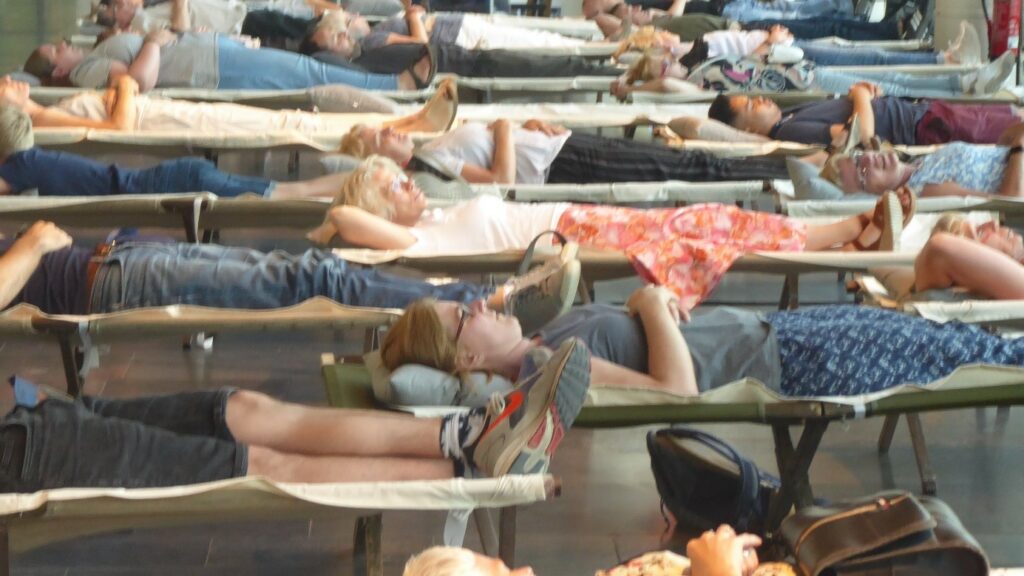
01.06.2023 – Tunnel oracle in Bremen
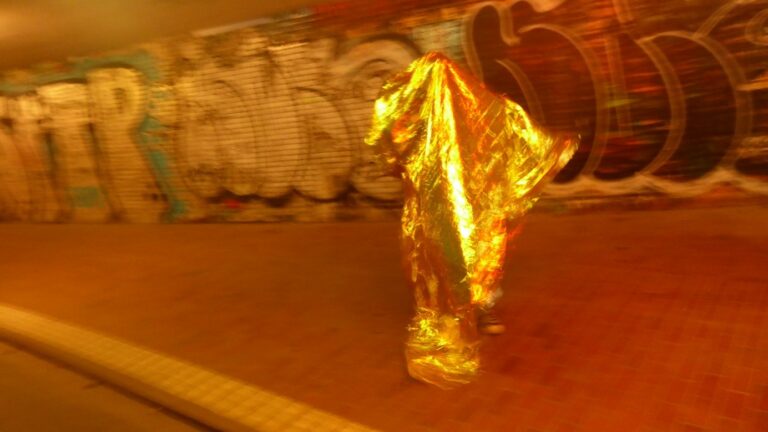
© Roland Quitt
NOperas! sets itself the task of bringing forms and ways of a new music theatre to the municipal theatre. However, the operations there are still geared solely to classical music theatre narrative forms. The interviews in Wiebke Pöpel’s film documentation of the last NOperas! project beautifully illustrate not only the irritations that this always brings for both sides, the municipal theatre and the actors of the independent scene, but also the necessity for mutual adaptation and learning from each other. How can orchestral musicians and children work together if the orchestra union only allows working hours when children are either at school or in bed for the night? This was the problem faced by “Fundstadt“. No one can be ordered to perform such services. Everything can only succeed through individual persuasion and a willingness to generously navigate past the existing rules.
At the main rehearsal in Bremen yesterday, many of the musicians and children posted around the city found only an astonished and at the same time uncomprehending audience of random passers-by. A mistake had crept into the sequence of photos that were supposed to serve as signposts for the actual test audience on their tablets – more than half were soon wandering disoriented through the city past the stations. In such situations, the theatre adheres to the firm belief that it is not a good omen for the premiere if final rehearsals go too smoothly. They fiddled with the tablets until four in the morning, and today at the dress rehearsal they all found their way. The golden apparition who met me in the pedestrian tunnel pushed me against the wall and then informed me (in a child’s voice): “I know everything, EVERYTHING about you!”. Everything really? Oh God! Little reassuring then was the further information: “You will die a VERY cruel death!” The gold being, Uta Plate then told me, pulling out her correction slip, had not been instructed to address me in such a nightmarish way. I advised her not to intervene. The tunnel sibyl had nothing nice in store for my companion either: “You’ll spill your coffee tomorrow morning!” In any case, misfortune remains relative! For tomorrow, we can only hope for a change in the November temperatures in Bremen.
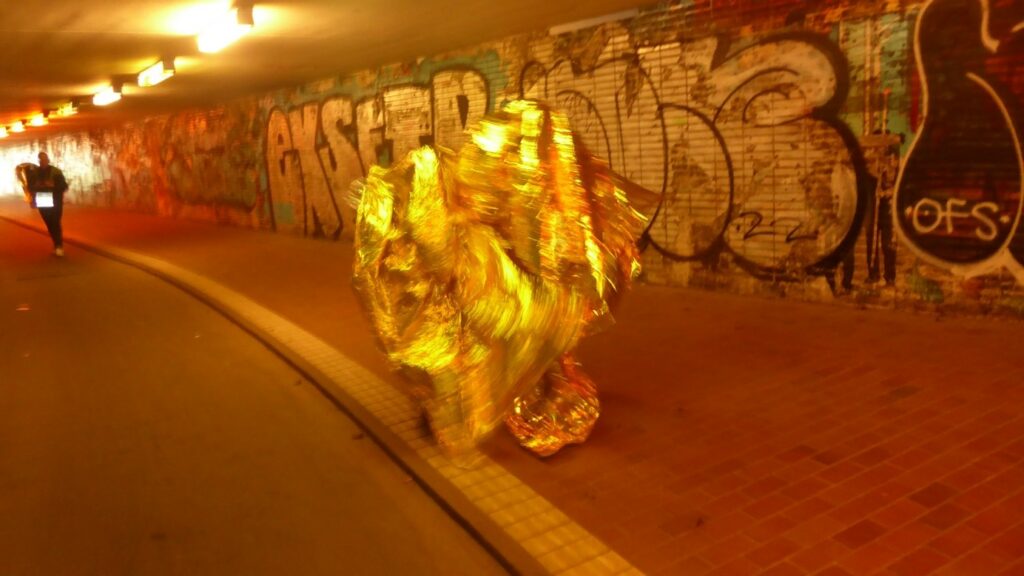
11.05. 2023 – “Freedom Collective” round trip
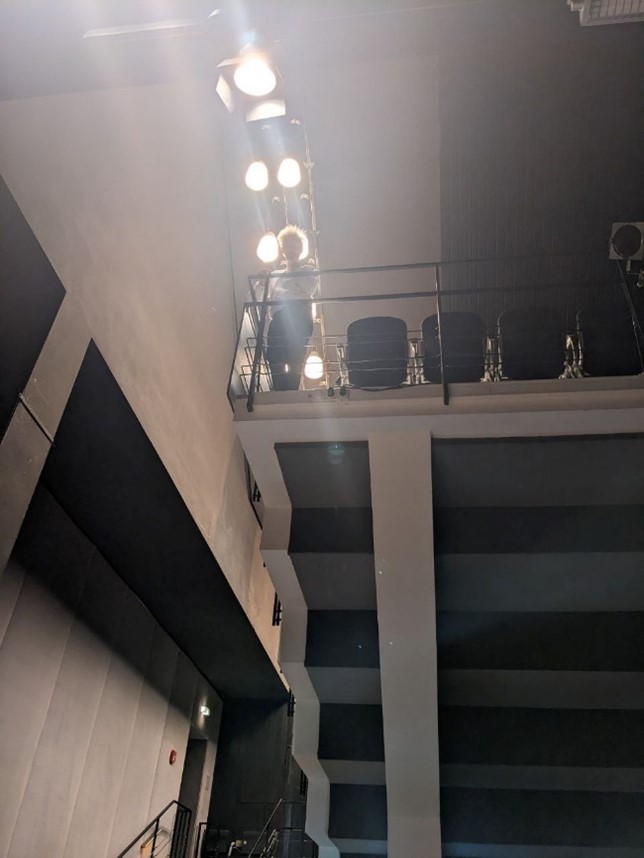
Heinrich Horwitz in the small house of the MiR © Emmerig
“Fundstadt” is in the middle of the final spurt and “Freedom Collective” is picking up speed. Often in May or June, two feXm production teams find themselves at the same venue. While HIATUS is working on the rehearsal stage of the MiR, a few rooms away the departments meet for the first conversation with the people from “Freedom Collective”. Heinrich (director) and Magdalena (stage) were still in Bremen yesterday, Darmstadt will follow next week. The idea is that the audience should be able to move freely during the performance. Each stage offers different constraints, each also different possibilities. The idea is that the audience will be able to hear equally well from everywhere – and this will require a lot of effort on the part of the sound departments. In addition, there is the challenge of the smartphone network, which provides additional input to what is happening on stage. The orchestra line-up has been fixed in the meantime. The final determination of the vocal parts is now pending. All the theatres should be able to cast the vocal parts from their own ensembles, if possible; guests will hit the production team’s own budget. Within the team, the staging has to be balanced with the music. Davor (composition) answers from Lyon, where he is spending the first of his two weeks at GRAME (Générateur de ressources et d’activités musicales exploratoires) and is already busy working on the level of electronic feeds.
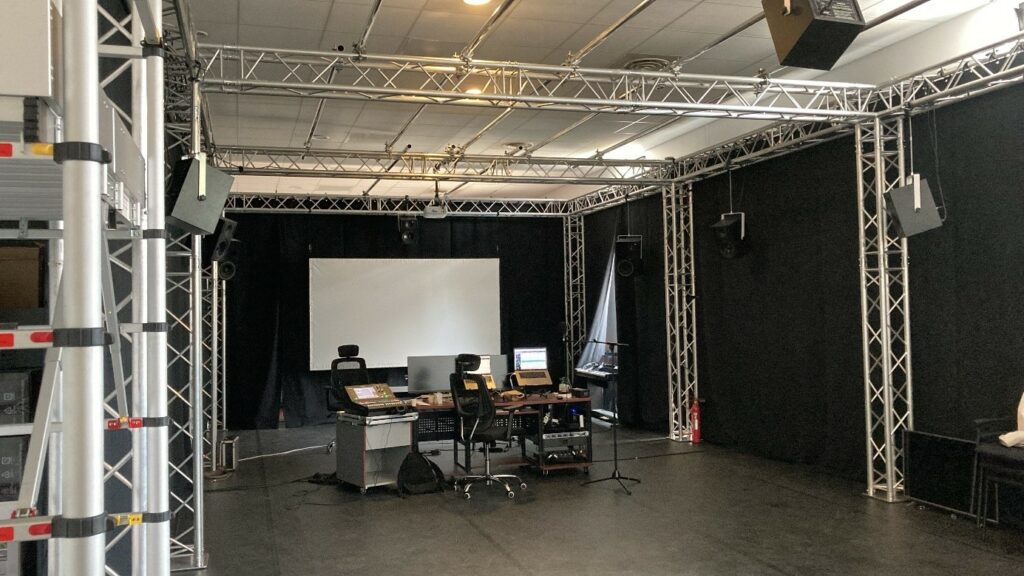
26.04.2023 – Eating socks and shooting lightning in Gelsenkirchen
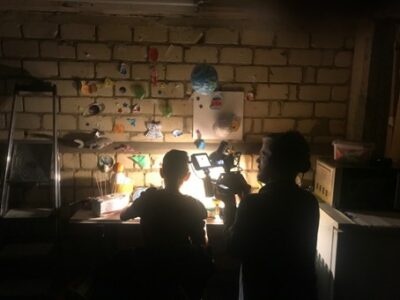
Jason's desk © Hiatus
Fundstadt enters the final spurt. The production team described this project in its application as an “urban topography of two cities from the perspective of children from socially different backgrounds”. Three children each from Gelsenkirchen and Bremen have worked and continue to work intensively on the project. In the meantime, they have all invented their own “thing” equipped with essential features, which according to their specifications is now being built in the workshops. Together with musical patrons from the respective orchestras, they have also composed the “thing song” assigned to their thing, which is now being recorded by instrumentalists from the orchestras in various chamber music formations. Each of the children will have their own station on the path that the audience will have to travel. The six children themselves, their objects and things will be components of the digital events, which will be called up at these stations via tablets. Along the way, you will also encounter live musical theatre actions, for which other children and other orchestra musicians have come together. One of the six film children is Jason. Hiatus wrote the following email to the Gelsenkirchen performers inside of his thing:
“Dear Mariana Hernández González,
dear Istvan Karacsonyi, Gioele Coco, Rainer Nörenberg, Uwe Rebers,
you are the DINGLied ensemble of Jason, we are happy to be able to experience you! Jason’s being is a creature from another planet made of red sand. It has four hands, two human ones, two crab claws, and on its head it once again wears bones to protect it from attacks. It can walk up walls and run upside down on the ceiling, it can make itself big and small, shoot lightning. Its favourite food is stinky socks. In the film, Jason virtually creates his own world. He starts in an empty white room and sets up his workspace in a garage, building his own solar system. One day he comes back to his studio in the garage and finds it transformed. There his being appears to him. Jason does not know whether his world has continued to build itself in his absence and thus the being has come into being, or whether the being has continued to build secretly. In the last music meeting with Jason, we laid the foundation for Jason’s DINGLied with the help of Jason’s fantastic “music godfather” Istvan Karacsonyi. Jason invented music patterns with the nine planets of our solar system. There are also settings by Istvan of the creature’s superpowers (see appendix for an example). The music will build up gradually in analogy to Jason’s film story.”
Duri Collenberg has developed a playing score for Jason’s Dinglied, the various parts of which are appended to the letter – below here: the notes for 1st oboe.
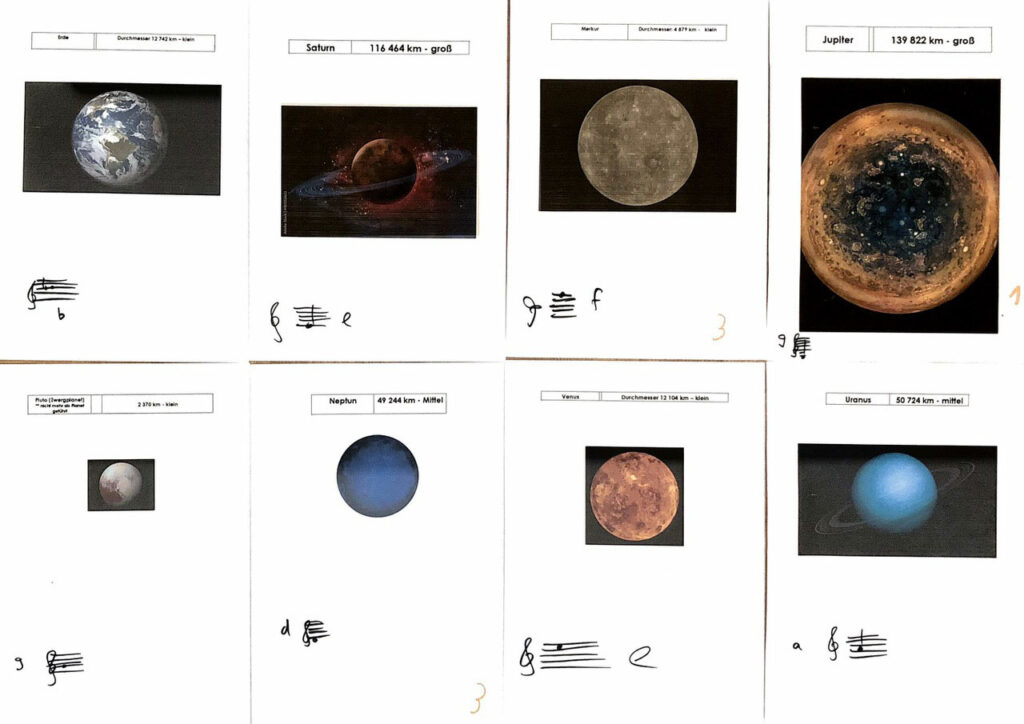
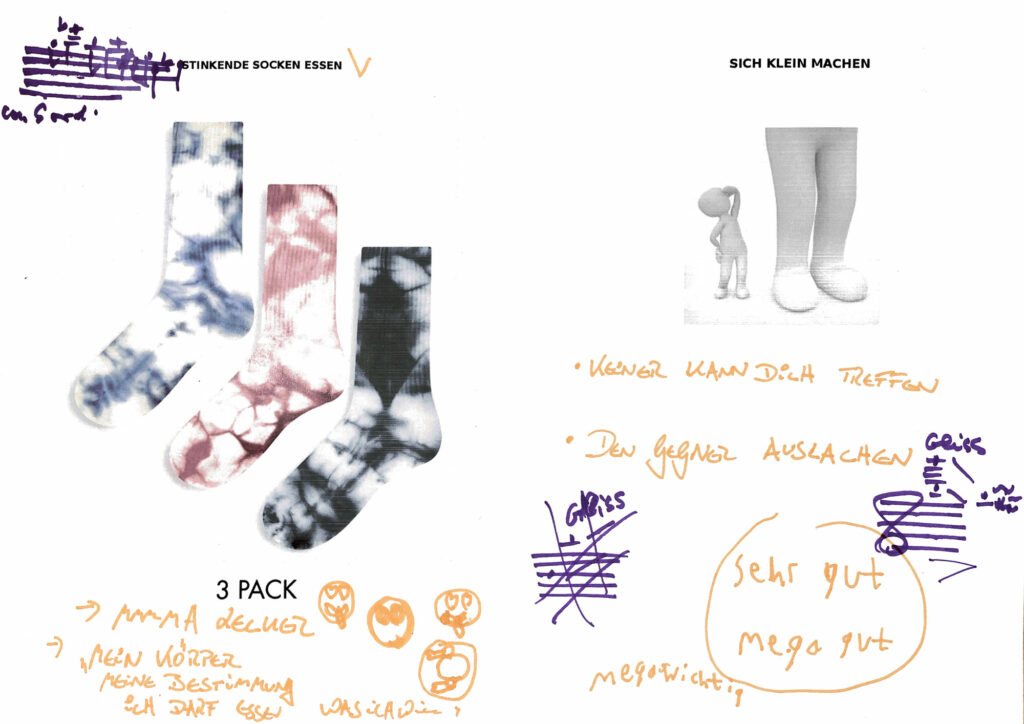
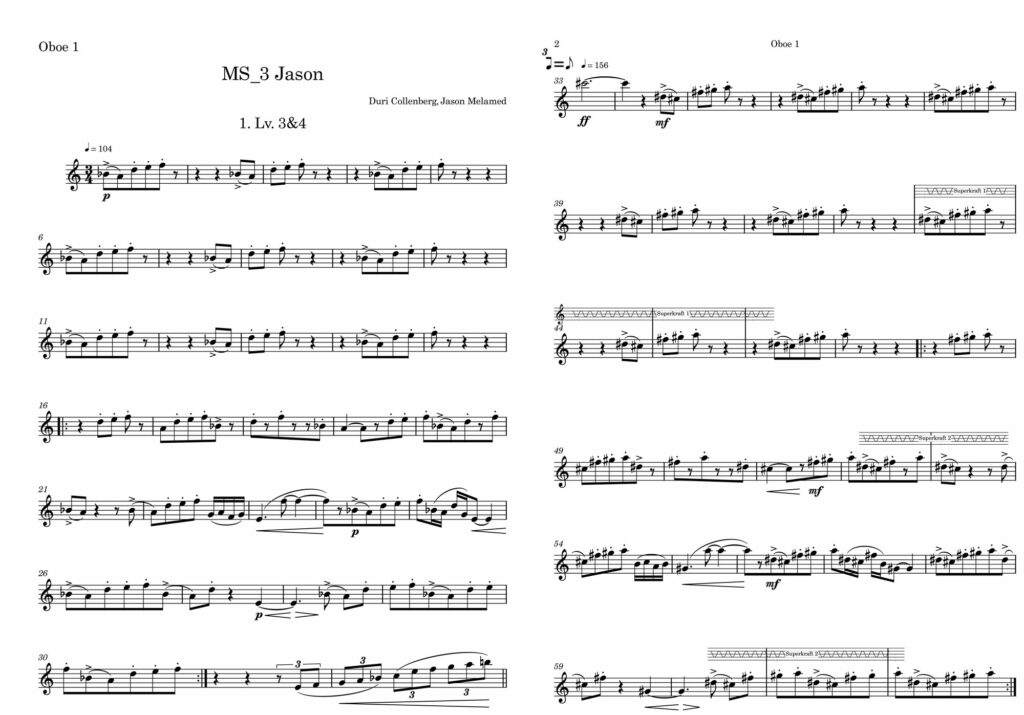
05.02.2023 – “XinSheng” is now called “Freedom Collective” / Davor Vincze receives Stuttgart Composition Prize
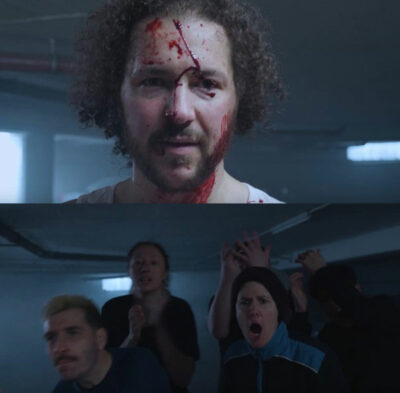
Stills from the film version of the short opera "Xinsheng" (Director: Heinrich Horwitz)
The project for the 2023/24 season has been fixed since October, and now finally its definitive title – “Freedom Collective”. Since December, the more precise plot outline has been in the making. For his preliminary compositional study (still titled “XinSheng”), Davor Vincze, together with Rama Gottfried and Andrés Nuño de Buen, received the renowned annual Stuttgart Composition Prize last weekend. More than 150 compositions had been submitted as applications. The three prize-winning pieces, which were premiered at the closing concert of the Stuttgart Eclat Festival, could hardly have been more different – Nuño de Buen’s guitar quartet: spare, restrained, almost hermetic; Gottfried’s “Scenes from the Plastisphere”: playful and open in form; “Xinsheng”: culinary, refined, with tonal delicacy and a grand gesture that does not shy away from the operatic. The ensemble Mosaik played with clarinet, cello, keyboard, percussion and (yes, this instrument really exists:) electric zither; Nina Guo sang. The sold-out auditorium applauded. We eagerly await the further progress.
14.01. – 28.01.2023: Second workshop phase for “Fundstadt” in Bremen and Gelsenkirchen

Duri Collenberg, Ali (© Uta Plate)
Musical theatre companies are highly specialised businesses, set up in all their processes for the classical opera form. Every NOperas! production creates challenges, and the most difficult ones can arise when they affect the orchestra. Children are supposed to work on compositions together with orchestra musicians in “Fundstadt”, but in the mornings children are at school, in the evenings they are asleep, and in the afternoons, as the union wants, musicians are not allowed to work, even if they want to. After a lengthy tug-of-war, this problem is now also off the table. Also, the performers of both orchestras are now in place.
During two workshops in Gelsenkirchen and Bremen last year, HIATUS recruited the six children around whose lives, dreams, hopes and self-composed orchestral music “Fundstadt” revolves. While other children will be involved in the theatre action, these six will only appear for the audience on the tablet feeds. In a second workshop phase, it was not only a matter of entering the life worlds of these six “film children”. Uta Plate and Duri Collenberg write:
“Our stay in Gelsenkirchen and in Bremen during the last two weeks was predominantly marked by the encounters with people with whom we will be, and in some cases already are, immersed in the artistic, content-related work for “Fundstadt”.
o The children: We visit all six film children individually, they take us on a long walk through their everyday lives. This leads from family to school, from religion to leisure, from the visible to the imagined.
o The musicians: There is a first personal conversation with colleagues from the Bremen Philharmonic Orchestra and the New Philharmonic Orchestra of Westphalia. In March, the work of developing the music begins; many ways have to be tried out in order to get from the children’s ideas of sound to a form that can be realised by orchestral musicians. The instrumentalists involved are to be involved in this process from now on.
o The people around the theatre in Bremen and Gelsenkirchen: With the filmmaker Aaike Stuart we visit places to which the walks with the children have led us. There are first tests of film sets, small test shoots with the children. For the route of our walk, we then find places near the theatre that are representative of the everyday and fantasy episodes of the film children as “stations” of the audio-video walk. In the process, we have spontaneous, wonderfully sympathetic meetings with local residents, petrol station owners, garage owners, directors of an old people’s home, whose participation will enrich the diversity of the stations of the walk and the film recordings.”
03.12.2022 – “Obsessions” in Wuppertal
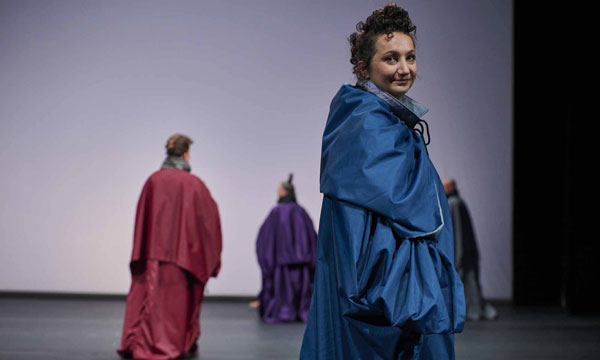
© Björn Hickmann
Independent theatre and music theatre ensembles in Germany usually work under precarious conditions. With the existing funding institutions, they shimmy from one project application to the next. Rarely is the funding then high enough to allow more than two or three performances in the end. The amount of work and the number of performances are hardly in a meaningful relationship and many a project would have more than deserved to reach a larger number of spectators.
The Netherlands and Belgium show that things can be done differently. Those who receive funding there receive it over several projects, so they are structurally secure and can plan for the longer term. Funded groups perform their plays not only a few times at the premiere venue, but tour with them across the many stages of the country, because unlike in Germany, these stages are not staffed with their own ensembles.
This has an impact on the aesthetic forms that music theatre takes there. After all, projects have to function not only in front of a smaller ingroup, which is usually the audience in Germany, but in front of a much larger group of an audience that is interested but by no means specialised in contemporary music. On the other hand, a much larger audience than in Germany is socialised with new forms of music theatre.
The cooperation of several theatres within the NOperas! programme tries to create synergies that compensate to some extent for the dilemma of local funding structures. However, productions do not move from one stage to another as completed projects, but at the same time find the opportunity for further development. Just how worthwhile this can be was already evident last summer with the further development of “Kitesh” in Bremen and now also with the second station of the “Obsessions” project in Wuppertal.
The decisive factor for the changed stage effect that “Obsessions” has now acquired in Wuppertal is the enlarged space in which the individual with his or her actions appears more isolated and therefore more emphasised. At the same time, the spatial distance to the audience is also greater in Wuppertal. This makes the stage action seem much more pictorial than in Bremen.
The new performers in Wuppertal each fill out the basic concept developed and adopted in Bremen in a new way. Whereas in Bremen it was easy to distinguish between actors, singers and members of the Oblivia ensemble in terms of the type and quality of their respective physical actions, the performers now form a much more cohesive ensemble that works on a homogeneous common basis.
Oblivia’s working method is similar in some ways to that of Pina Bausch, and even though this choreographed theatre is quite different, at the premiere Wuppertal seems to have remembered the old days. There was great and sustained applause.
07.11.2022 – Further work on “Obsessions” begins in Wuppertal
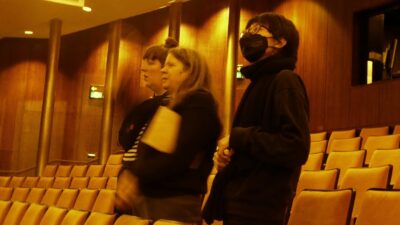
Mock up set rehearsal »Obsessions« in Wuppertal: Alice Flerl, Annika Tudeer, Yran Zhao © Roland Quitt
“Obsessions” is now entering its second round at the Wuppertal Opera. Last week there was a rehearsal, today work began with the soloists, and the premiere is on 3 December.
There was actually nothing to “build” at the rehearsal – the play is performed on an empty stage. According to the original concept, Wuppertal’s revolving stage was to be an essential element of the performance, but after the flooding of the opera house last year it will not be operational for some time. As in Bremen, the instrumentalists are integrated into the stage action: In Bremen’s small house they had to sit at the left side, here, on the large stage, other possibilities arise, several have now been tested visually and acoustically.
Matthieu Svetchine from the Bremen ensemble has come to the Wupper. Apart from him and the actors from Oblivia, these are new actors. The multi-part form that the project took on in Bremen, both musically and theatrically, now serves in Wuppertal as a basic grid to be filled anew with the Wuppertal performers’ own input. So for the newcomers, too, it is now a matter of deriving individual theatrical actions from the improvisational preoccupation with the theme of “obsessions”.
It cannot be just a “rehearsal” because of the completely different dimensions of the stage space. Wuppertal’s stage is now not only much wider, but also much deeper, which, unlike in Bremen, suggests thinking in terms of foreground and background. The number of instrumentalists has increased, but the number of performers remains the same – the individual is much less absorbed into the group in this larger space, so individual actions appear more prominent, more exposed.
Yran Zhao has reworked her composition to suit the larger ensemble and at the same time created a new system of notation. Through more flexible instructions, the musical performance should be able to be adapted to the scenic even more than in Bremen.
22.10.2022 – Start of the practical theatre work on the “Fundstadt” project

Gelsenkirchener Musiktheaterwerkstatt: Mitwirkende Kinder, »Baumgesicht«, »Alien aus der Wand«, Sampler (© HIATUS)
Over five days in October, HIATUS worked with groups of children from Bremen and Gelsenkirchen to develop “sound-image ideas”. Designed as independent, self-contained events, these workshops now serve in a second step to select and recruit three children from each of the cities who will then also be at the centre of the performance of “Fundstadt”. According to the HIATUS method, finding and inventing sounds is closely linked to the visual and pictorial, specifically at the MiR to a “finding of faces”. Here HIATUS document their work process in Gelsenkirchen:
“We enter the field with the following question: In what form can we make the possibilities of music available as a space for working and experimenting?
And with this, the first co-composition methods with children become concrete. In the workshop, the children’s research begins with three focal points:
- Looking inwards to one’s own perceptions, memories, dreams.
- Perceiving other players.
- Grasping the environment in public space.
At the end of the workshop week, the performances of our “Wesenslieder” will take place at different locations around the MiR, bringing these three aspects together in the form of a sound performance. This is what the “Pareidolie Game” leads to, a process laid out over two days. In the first step, the children go out and find “faces” of beings in buildings, trees, traffic signs, etc. in public space. At these places they make sound recordings that capture the ambient sounds and some site-specific conspicuous sounds. In addition, each child plays the “creature location” like an instrument (e.g. scratching in the gravel, knocking on the garage door, etc.). With all these recordings, we build a sampler instrument for each being: each time a key is pressed on a small piano keyboard, a different sound is heard.
Our common starting point of finding “faces of beings” in public space and then giving them expression through sounds led the children to the possibility of experimenting with a sampler and combining their own recordings as building blocks to create “instant compositions”.
On the last day, the children perform with the sampler on their “beings”. We experience different performances:
- A concert with an audience.
- A duet between sampler sounds and another child responding with live sounds.
- The performance of a theatrical improvisation task that lets the children interact with the surrounding space.”
20.10.2022 – The NOperas! project for the 2023/2024 season has the working title “XinSheng”.

Das neue Team: Vincze, Horwitz, Emmerich, Hut Kono, Petrović, Menzel
Every year, the applications to NOperas! show that the independent scene is overflowing with ideas for new music theatre. Immersive concepts in particular are currently booming among the applications. Many of the projects submitted would have deserved to find their way to the City Theatre this year as well. Accordingly, the jury had a hard time deciding this time as well. After an additional (and thus third) jury meeting, the project for the 2024/24 season has now been decided: it bears the working title “XinSheng”. The production team consists of Davor Vincze (music), Aleksandar Hut Kono (text), Heinrich Horwitz (direction), Magdalena Emmerig (stage design), Premil Petrović (music director), Therese Menzel (production manager).
The Chinese word xīn shēng (新生) points to the sphere of association of regeneration and new life. Here it stands for a fictional drug that promises an increase in energy in the competitive struggle, but has hidden side effects and leads to premature death.
“XinSheng” is an intermedia project in which the live element of stage action is supplemented by digital media on an equal footing. “The piece,” says the application, “aims to sensitise the audience to a semi-dreamy, uncanny state in which everything is confused, loosely defined and slightly contradictory.” The focus is to be on the question of the way in which we construct “reality” from an excess of fragmented and thereby often contradictory information. For a more precise understanding of the plot, the audience is to be dependent on the use of smartphones – but not everyone is to come across the same information here.
Davor Vincze is the winner of several composition prizes. His music is performed by important ensembles for contemporary music (including Ensemble Modern, Ensemble Intercontemporain, Klangforum Wien). Analogous to the visual level, the musical live performance will also mix real instruments at the moment of sound production and “electronic” instruments from the field of digital playback.
Aleksandar Hut Kono has published two volumes of poetry that have won several prizes in the countries of the former Yugoslavia. He also gained experience in the field of musical theatre with libretti for the US composer Evan Kassof.
Several works have already brought Heinrich Horwitz (they/them/she/her/he/him) together with renowned composers and music ensembles as a choreographer and stage director. Most recently he was responsible for the music theatre “HAUS” with Sarah Nemtsov and Rosa Wernecke at this year’s Ruhrtriennale. He also works continuously as an actor in theatre, film and television.
Typical for the breaking up of conventional professional fields in the field of new music theatre, Magdalena Emmerig‘s work goes beyond her studies as a costume and set designer. In video works and performances, she explores the theatrical potential of digital media and images of gender and femininity. As part of the group “THE AGENCY”, she works on immersive theatre installations.
Premil Petrović is artistic director of the No Borders Orchestra, which he founded in 2012. His first recording with the NBO has been released by Universal Music/Deutsche Grammophon.
The Fonds Experimentelles Musiktheater is looking forward to this new team!
13.09.2022 – Jury meeting in Düsseldorf
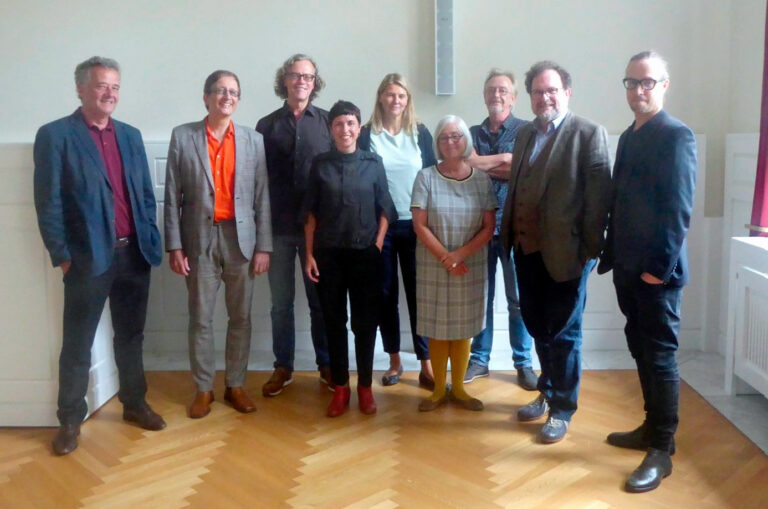
Die NOperas!-Juryrunde für die Spielzeit 2023/24. Christian Esch (feXm), Csaba Kezer (feXm), Rainer Nonnenmann, Susanne Blumenthal, Kirsten Uttendorf (Staatstheater Darmstadt), Brigitte Heusinger (Theater Bremen), Roland Quitt (feXm), Michael Schulz (Musiktheater im Revier), Moritz Lobeck
The feXm jury met on 13 September. The venue was the Kunststiftung NRW in Düsseldorf. New to the round was not only the Staatstheater Darmstadt, but also the expert team of Susanne Blumenthal, Rainer Nonnenmann and Moritz Lobeck. Thirty-six applications had to be assessed in advance (the year before there were twenty-nine). Five finalists were chosen after a long day. As always, a few more would have liked to be shortlisted. They are now invited to an in-depth discussion with the jury on 26 September at the NRW KULTURsekretariat.
07.07.2022 – Premiere “Kitesh” in Bremen

© Roland Quitt
Among the NOperas! projects to date, “Kitesh” is the most elaborate. As in Halle, all departments in Bremen, which has two NOperas! productions in its repertoire this season, were involved in intensive work. Wisely taking into account that “Kitesh” had been “lying” for a year and a half, Bremen added an additional ten days to the agreed rehearsal time. All the effort, as the premiere shows, has paid off.
Kitesh” still consists of three parts. One in the city space (the audience is divided into groups), one in the foyer (everyone goes their own way) and a third in the traditional situation of the peep-box stage. An armed Hun storm in the stalls and wild escapes in the tiers, however, don’t really let you settle down even there.
In the opera business, whole generations of singers can be channelled through a successful production. The main task of every assistant director is to show the respective new cast ways and actions that have been developed and rehearsed by others. It is therefore better for a director not to make his work too dependent on the external appearance, personality and individuality of his premiere cast. “Hauen und Stechen” have made a name for themselves with a concept that works exactly the other way round and frees the singer-actor from being a puppet. With the largely new cast in Bremen, a new play with changed figures, characters and emphases has emerged.
“Kitesh” in Halle was a spectacle of still roughly hewn building blocks, improvisational lust patched up what was still rather unfinished. Hardly anyone complained that they could hardly follow the plot – the spectacle outweighed that. In Bremen, finer lines were now drawn that made many an interpretative intervention in Rimsky’s opera more comprehensible and wrested a new and perplexing reading from its convoluted reassurance of the afterlife.
Rimsky’s Kitesh opera was premiered in 1916, the same year as Schoenberg’s Chamber Symphony. It has many enchantingly beautiful passages, but is hardly free of folkloristic kitsch in others. It is daring to simply orchestrate it downwards, when Rimsky’s much-vaunted strength seems to lie above all in the magic of the orchestral colours. In Halle, my opinion was confirmed that this could hardly go well. In Bremen, I heard it differently. Freed from all wafting and embedded in the contemporary sounds of Alexander Chernikov, Rimsky’s melodic inventiveness now comes to the fore. His music seems quotation-like or folklore, but hardly folkloristic any more.
The elaboration of the almost uninterrupted double action of stage action and simultaneous enlargement of scenic details through the observation of a live camera has also become more precise. When Kitesh sinks, the sinking trench and the film projected over it now interlock in such a way that ahs and oohs can be heard from the audience.
The rush for “Kitesh” was great and so Bremen sold additional tickets for the following performances, despite the crowds that had to be accepted for the first part.
A wind machine caused a red flag to wave while the main rehearsal was still in progress. It changed colour in the main dress rehearsal. What worked in Halle in 2020 suddenly doesn’t work anywhere in Europe. There are people who think that one should not play pieces by Russian composers at the moment. On the contrary, playing them now seems more important than before.
19.06.2022 – Survival training with HIATUS in Zurich
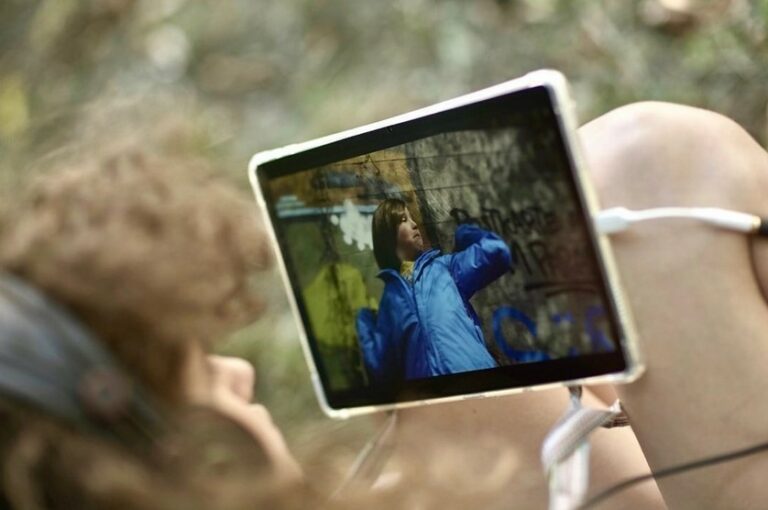
© Sava Hlavacek
The grounds of the Blickfelder Festival are outdoors at the so-called Turbinenplatz directly behind the Zurich Schiffbau. Despite the festival, not many people are out and about here on this Sunday. A place in the shade seems more desirable to most than participating in an urban space project that leads up and down the Zurich hills in the scorching heat. “You’ll pass two fountains, take enough water with you anyway!” is the instruction. And off we go on an audio- and video-controlled scavenger hunt that infamously leads twice along the Limmat, where half of Zurich is cooling off in the river.
“Vier Viertel” is about the world of experience of children from four different districts of Zurich and at the same time serves as preparation for “Fundstadt”, i.e. the NOperas! project that will be performed in Gelsenkirchen and Bremen next summer.
For their audio-and-video walk, HIATUS have invented an audiovisual guidance system that will also be used later in “Fundstadt”. At first I’m annoyed by how complicated it is to put on the whole outfit: a combination of tablet, headphones, cape and hood. Then I quickly begin to realise how sophisticated it is. On this day, the hood protects me not from rain, but from heatstroke. When it comes to crossing streets, the tablet tells me to take off my headphones.
I meet four Zurich children on the way through the four Zurich districts. Hear their voices. Hear their music. I see them appear as ghostly figures on the tablet in the very scenery where I am stopping.
Four quarters, that means about an hour’s walk through different Zurich milieus. Does it seem to me, wrongly, that even the two toughest girls in Zurich’s Wunderland lead a more suspended life than perhaps some girls in Gelsenkirchen?
“Vier Viertel” is a nice and inspiring starting point for thinking about and further discussing “Fundstadt”, a project that, unlike the one in Zurich, is also to include live-action theatre. Gelsenkirchen and Bremen are to be short-circuited with each other. But how do you show Gelsenkirchen in Bremen and vice versa? And how can one at the same time stick to showing the children in “their” milieu? What takes the place of the lonely Zurich scavenger hunt adventure when whole groups of visitors are sent on their way together in “Fundstadt”?
We are still at the very beginning with “Fundstadt”.
01.06.2022 – Darmstadt comes on board / New call for projects / Review
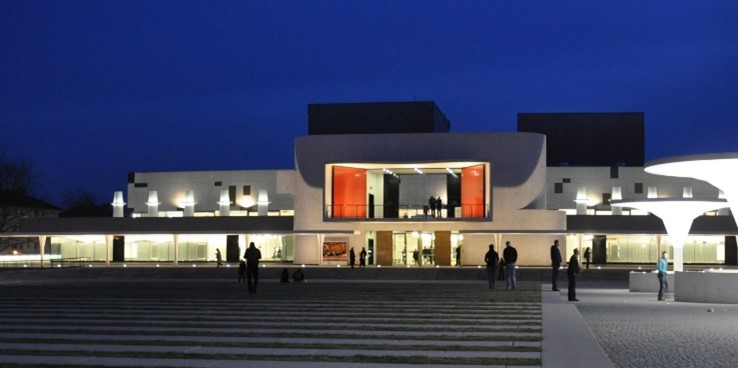
Foto: Andreas Praefcke © Staatstheater Darmstadt
NOperas! is launching a new call for projects. The fifth – and thus the second within a second three-year season.
Alongside Gelsenkichen and Bremen, Darmstadt is now on board as the third house. Darmstadt is an important venue in the German music theatre landscape that has repeatedly attracted attention with its daring and special projects.
NOperas! has taken a rather bumpy and winding road so far.
“Chaosmos”, the first project, premiered in Wuppertal. Rehearsals for the continuation, which started later in Halle, had to be cancelled because of the lockdown. Everything else shifted from the stage to the digital world and “Chaosmos” mutated into an interactive film project, which then found its place on the websites of the participating theatres.
Germany’s stages had opened again when “Kitesh” was then launched in Halle. Hygiene regulations complicated the rehearsals. There was a very successful premiere, but due to illness, the second performance was already dominated by short-notice cast changes. Others then fell ill and the third performance had to be cancelled.
Corona meanwhile turned the theatres into a marshalling yard where trains constantly change tracks instead of setting off at some point. Wuppertal and Bremen had to postpone further development of “Kitesh”. Then the Wupper burst its banks, flooding the Wuppertal orchestra pit, ruining the technical equipment and many expensive musical instruments. Wuppertal was literally up to its neck in water and cancelled “Kitesh”. With a delay of one and a half years, only a second stage of development is now pending in Bremen.
Meanwhile, other difficulties arose in Halle. The artistic director changed prematurely and Halle therefore dropped out of NOperas! As with “Kitesh”, only two houses were now involved in “Obsessions”.
With the last call for proposals, the second three-year season began in 2021. Gelsenkirchen took the place of Wuppertal. In times when most theatres tried to save themselves with repertoire hits like “Carmen” and “Magic Flute”, no quick replacement could be found for Halle’s departure. From the outset, therefore, this call for tenders was restricted to only two cities (Bremen in addition to Gelsenkirchen).
The current tender will run for six weeks. With Darmstadt, a third high-calibre theatre is now involved. Kirsten Uttendorf, Darmstadt’s opera director, managed the Akademie Musiktheater Heute (AMH) for a long time, a support programme of the Deutsche Bank Foundation for young musical theatre talent. Many took part in it who now belong to the créme of the independent music theatre scene.
So NOperas! has just made it back to its original model with great difficulty. Will we find ourselves in calmer waters? The signs for culture in Germany are stormy. It will probably take a lot more stamina.
19.02.2022 – Premiere “Obsessions” in Bremen
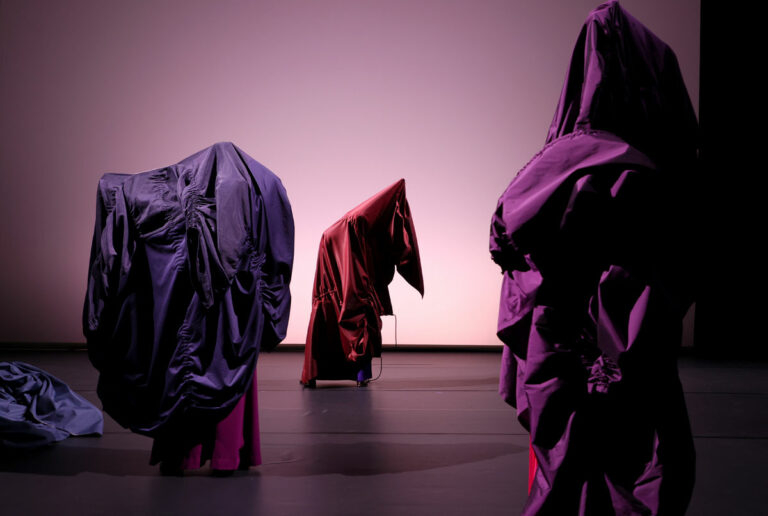
© Jörg Landsberg
Five weeks were spent working in Bremen. The result is a play that draws equally on the personality of each participant. A play in which everyone is a leading actor.
An ensemble with no division of tasks. Everyone sings, plays and speaks. The fact that one can recognise who is a singer, who is a professional actor and who belongs to the Oblivia collective only reinforces the impression of mutual rapprochement in the common crossing of boundaries.
Covid still struck after the dress rehearsal, Timo Fredriksson from Oblivia spends the premiere in quarantine. In a play that draws on the personality of everyone involved, no one is actually replaceable. Alice Flerl, Oblivia’s dramaturge, who in Bremen, unlike in other productions, should not actually be on stage herself, steps in, takes over the actions he has developed. There’s no other way if the premiere is not to fall through.
Yiran Zhao accompanied the rehearsals and took up suggestions from instrumental improvisations. The result is music that serves the scene at every moment, sometimes even taking a back seat to the action of the performers, but never abandoning the complexity of contemporary sound language and ultimately cannot do without a conductor. Therefore, the idea of including the instrumentalists in the scene could not be sustained. Only at the end of the piece do they themselves become actors.
Those who improvise need something to improvise about. For Oblivia, themes are above all a means to an end. The scenic material, which started out as a collective improvisation about obsessions, does not always reveal its origins later on, and can turn into the abstract, because in the end it is only form and scenic rhythm that count when it is put together. Some of the audience may have had false expectations as a result of the announcement texts. “I liked it, but I didn’t really understand anything,” said one person after the premiere. “Was there anything to understand?” replies his companion. Her gaze, devoted to the image and not looking for a story in the performance, was certainly the more appropriate one.
Long applause. Many in the Bremen audience broadened their understanding that evening of how many different paths musical theatre can take today.
In October, it will continue in Wuppertal. First, workshops for musicians and singers. The premiere will be at the beginning of December. The large-scale scenic structure found in Bremen will be retained in Wuppertal. Everything else – including the music – will take on a new form with new participants. Opera, drama and dance are under separate artistic direction in Wuppertal. Unlike in Bremen, it seemed impossible at first to work across the disciplines. Thanks to the efforts of the Wuppertal music theatre directors, members of the local theatre and dancers from the Pina Bausch ensemble are now also involved.
12.10.2021 – Oblivia begins workshop work in Bremen
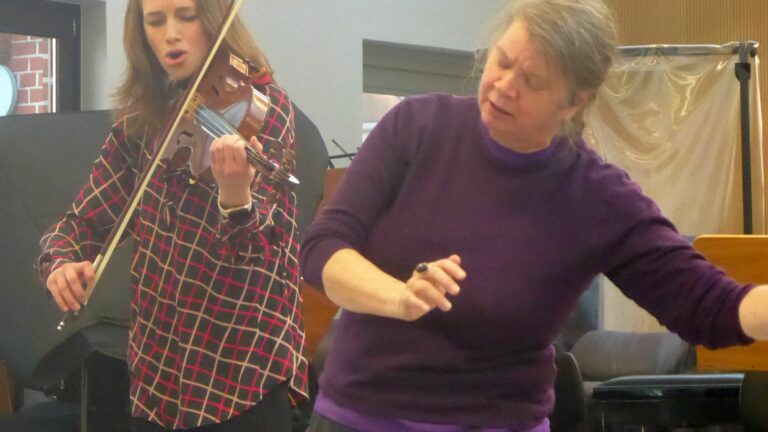
Workshop-Arbeit mit den Musiker:innen des Bremer Orchesters: Annika Tudeer (Oblivia), Timo Fredriksson (Oblivia), Hélène Freyburger (Flöte), Gregor Daul (Oboe), Anatoli Jagodin (Posaune), Rose Eickelberg (Perkussion), Reinhold Heise (Violine), Marie Daniels (Viola).
When Oblivia dedicate themselves to a new project, there is first an agreed theme, everything else is then developed from the first moment on in joint improvisation. The scenic work on “Obsessions” began during the past months. Two of the participants live in Berlin and Essen, the others in Helsinki. Although they improvised together, they were only connected via the internet due to travel restrictions. Improvisation with the local singers and musicians began in Bremen in a relaxed workshop atmosphere. For Oblivia, too, this meant uncharted territory. The challenge of developing a piece in which other people were involved for the first time in addition to the actors of the group itself led to a compromise with the previous way of working. Internally, the basic grid of an overarching structure for the piece had already been worked out, but in Bremen it was a question of approaching the open spaces for singers and musicians. Such work is not possible with all singers and certainly not with all orchestra musicians. The Bremen Theatre has made clever arrangements. Everyone showed themselves to be highly motivated to break new ground and to embark on the adventure of developing this piece as not only interpreters and performers, but also as co-creators.
11.10.2021 – Decision-making processes / New project for 2023: An as yet unnamed theatre work by the HIATUS group.
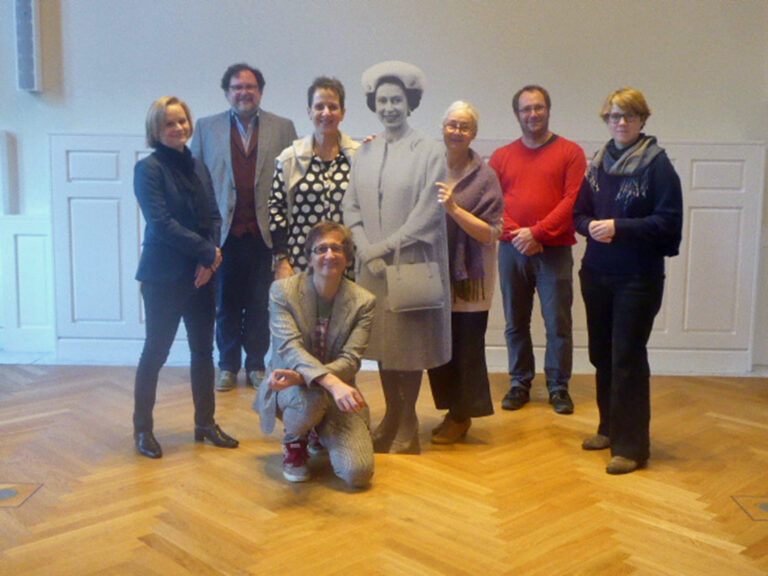
Hoher Gast bei der Jurysitzung am 30.9. – V.l.n.r: Christina Dath (Verwaltungsleiterin NRWKultursekretariat), Michael Schulz, Konstantia Gourzi, Csaba Kezer, Elisabeth II., Brigitte Heusinger, Sebastian Hanusa, Irene Lehmann (© Roland Quitt)
The theatres participating in NOperas! have committed themselves to three-year cycles. The first of them comes to an end with this season. Together with the participating theatres, NOperas! is still laboriously manoeuvring its way through the corona-induced shunting of theatre schedules. Would it have made sense to breathe a little more air into the matter, not to announce a new project for one season, to postpone the second cycle by a year? As the only funding instrument in the German-speaking world that explicitly targets newer forms of music theatre, NOperas! is an important contact point for the work of the independent scene – to suspend it would have meant withdrawing support from this scene at a moment when many of its actors are still threatened in their existence as a result of the past theatrical lockdown.
It remains interesting: This year’s call for proposals was increasingly used by newcomers, while some of the more established players in the scene signalled that they themselves were still sitting on too many postponed projects to be able to devote themselves to new goals at the moment.
But this hardly made it easier for the NOperas! jury to select one and only one production from the many applications that deserved funding this year. In public, there is always the misunderstanding that feXm and NOperas! follow the idea of a competition, that the jury therefore connects its project selection with the statement that it is the “best” of all the submitted concepts. It is not without reason that representatives of the performing theatres are also involved in this committee alongside independent experts. Considerations based on their respective play concepts are also always taken into account in the selection of projects.
Six finalists were invited to Düsseldorf on 30 September to answer questions about their applications. At the end of the day, the jury was still not unanimous and so the decision was only made during an additional meeting on 11 October.
The first project of the new three-year season will be a (for the time being still unnamed) production by the Swiss-German group HIATUS. HIATUS are: composer Duri Collenberg, improvisational musician Lukas Rickli and theatre-maker Uta Plate – more about them soon on this website.
At the centre of their project, which fuses elements of an audio and video walk with the theatre action of singers and instrumentalists, is the experience, thinking and feeling of a selected group of children from different social backgrounds. What impressed the jury about the submitted concept was both the claim to meet the children involved at eye level and that of turning the musical and theatrical work with them into an ambitious theatre for adults. A dialectic play that takes adults back to an earlier existence of elementary conflicts, wishes and hopes. A reminder could emanate from it of our responsibility for this distressed planet, which we will soon have to hand over to the younger ones.
Within the framework of the production, a cooperation with the Zurich festival Blickfelder is planned. Initially, a version will be performed in Zurich that is limited to the digital level of audio and video feeds and will only be expanded with theatrical action in the course of further development in Gelsenkirchen and Bremen.
06.09.2021 – Difficult times for Wuppertal Opera

© Markus Distelrath | pixabay
Berthold Schneider and his team at the Wuppertal Opera are going through difficult times. COVID has forced them to suspend operations since May and to postpone rehearsals and premieres again. Just now they had planned anew – then came the flood in July. Those who know Wuppertal know how close the opera is to the river: The floodwater penetrated into the lower part of the opera house, it flooded the orchestra pit and damaged many instruments. The damage is now estimated at around 10 million euros. The stage is not expected to be playable again until December at the earliest. It is little consolation that the Wuppertal Opera was chosen as one of the eleven winners of the Federal Theatre Prize for its artistic programme a few days before the flood – another is the Schlosstheater Moers, which presented François Sarhan’s multi-part feXm production “The Suitcase” in 2017 and 2018.
Unfortunately, the NOperas! project “Obsessions” has also been affected by the Wuppertal flood disaster. Even if it is possible to play again in December, it will take much longer to repair the damage to the submachinery. It will also be uncertain for a longer period of time whether the revolving stage, which is indispensable for this project, will be available again for the planned Wuppertal premiere of “Obessions” next March. If at all possible, the date should nevertheless be kept. The search has therefore begun for an alternative venue in the wider surroundings of the city.
08.07.2021 – Summer 21: Looking back on a hurdle race
NOperas! celebrated its first premiere in Wuppertal in January 2020 with the first performance of “Chaosmos”. At the time, people in the canteens talked with horror about a strange virus that had spread in China and were still convinced that they were at a safe distance. This soon turned out to be a mistake and soon after NOperas! started, the theatre was no longer the same. Corona, then, is about the same age as NOperas!, has remained an uninvited companion to this support programme ever since and continues to force it down improvised paths to this day.
The planned further development of “Chaosmos” on the theatre level did not happen, rehearsals in Halle had begun and had to be cancelled. As so often in the past, a film was made as a substitute, which Bremen and Wuppertal presented on their websites.
Under tense conditions, “Kitesh” then had its first performance in Halle in autumn 2020. But here, too, the virus got in the way. There was only one further performance, the third could not take place due to changes in hygiene regulations.
After extensive preliminary conceptual work on the Wuppertal version of “Kitesh”, the Wuppertal Opera then found itself forced to completely cancel – the lockdown had prevented the planned performances in January, “Kitesh” was initially postponed to May, but even then it could neither be rehearsed nor performed, and the house found itself unable to postpone it again. Bremen, on the other hand, has now saved “Kitesh” for the coming season, where it will be further developed and performed after (!) the premiere of the new NOperas! project “Obsessions” there.
Meanwhile, NOperas! and its partner theatres say goodbye to the season break with a small digital fireworks display that summarises once again what has been created in spite of everything within the framework of this programme:
As a substitute for the announced performances, Wuppertal Opera presents on its website a short film created as part of “Kitesh” – in its theatre productions, Hauen und Stechen work with filmic material in a variety of ways, and here it is now the other way round: a filmic work that extensively incorporates material from the theatre.
At the same time, after three and a half years of daring musical theatre explorations, the Halle-based management team around Florian Lutz is now taking its hat off by staging a festival entitled “Everything Ends” at the end. With live musical accompaniment by Marc Sinan, there will be a public viewing of the “Chaosmos” film on the forecourt of the Hallens Opera House. The event will be streamed simultaneously from a “virtual opera house” created for the festival. For both, see the calendar.
In addition to the short film, which will also be presented by Wuppertal Opera, a second film by the production team on the subject of Kitesh will be available as video on demand during the festival. It will soon be available on this website, “Chaosmos – The Film” can be found here, “Kitesh / Short Film” here.
23.06.2021 – Jury meeting
Recently at the Zoom Symposium of the Austrian Music Theatre Days, NOperas! was presented as a competition. This can be seen as such, but it hardly corresponds to the self-image of this programme. The emphasis is hardly on putting some “best” music theatre project in the spotlight every year, let alone choosing a “winner”. Many applications would have deserved to be selected each time, but neither feXm’s funds nor the capacities of the participating theatres are sufficient for more than one production each.
This year, the jurors had to work faster and more intensively on evaluating the project proposals they received. This time, the current discourse on diversity and the distribution of power in theatre is reflected in a whole series of them. The first jury meeting took place yesterday via Zoom with a largely new line-up (→ see page Jury). Five projects made it to the finalists.
16.06.2021 – Oblivia Production Diary 3
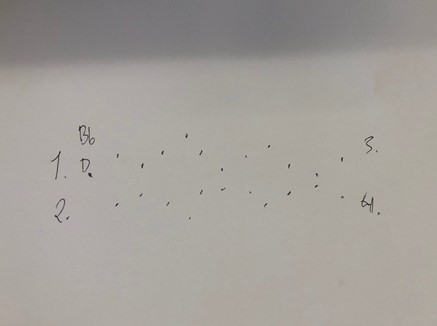
Tua Helve writes:
“Having just finished our latest Obsessions rehearsal period mid-May, I wanted to dedicate this blog entry for time. Time – abundance and lack of it!
However, in performance making, it is not only time but also, and more so, time in relation with what happens around it, with it. In Paul Allain’s preface to The Art of Rehearsal. Conversations with Contemporary Theatre Makers (2017, edited by Barbara Simonsen), time is entwined with ‘a team’ and ‘trust’. These ‘three Ts’ are referred to as ‘fundamental’ for the interviewed theatre-makers. The Ts – time, together with a team and trust – are innate for Oblivia’s way of working as well (see previous posts, e.g., about Trust in June 2020).
Pausing to muse on this once again I realized, for me, trust encapsulates time and the team; the team gives rise to trust; the team need to trust in time. To illuminate this, the ‘fundamentals’ of working with Oblivia, I chose snapshots from the ongoing Obsessions process:
Snapshot 1. Trust – points on paper will become a performance – Please see the drawing above.
Snapshot 2. Time – to fool around (and) to create serious material – Annika and Timo at Eskus.
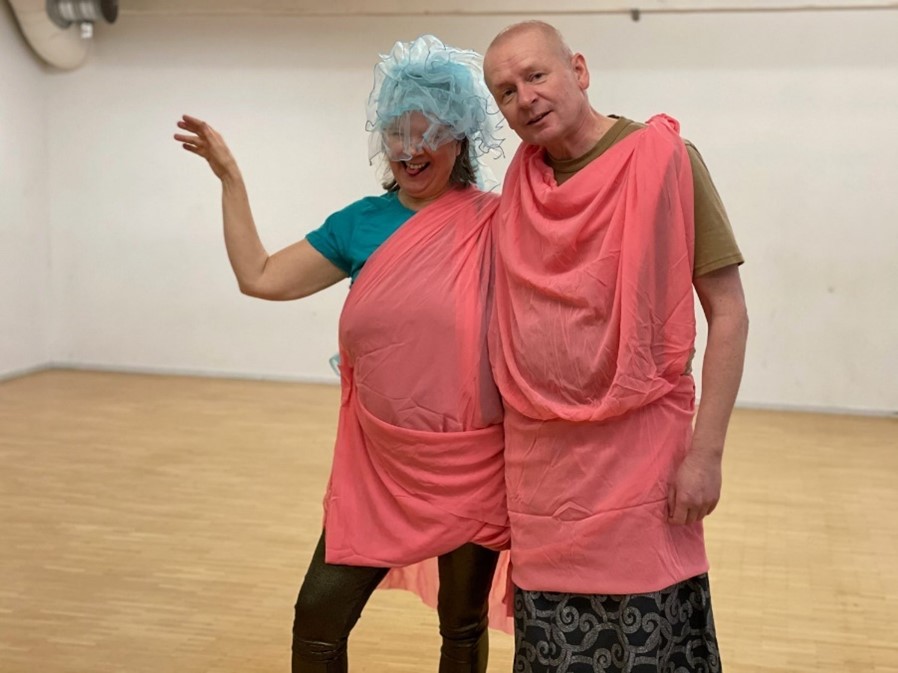
Snapshot 3rd team – always kept on board – Annika chatting with Meri (Brussels), Alice (Düsseldorf) and Yiran (Stuttgart/Berlin) via Zoom, Anski preparing to record the rehearsals.”
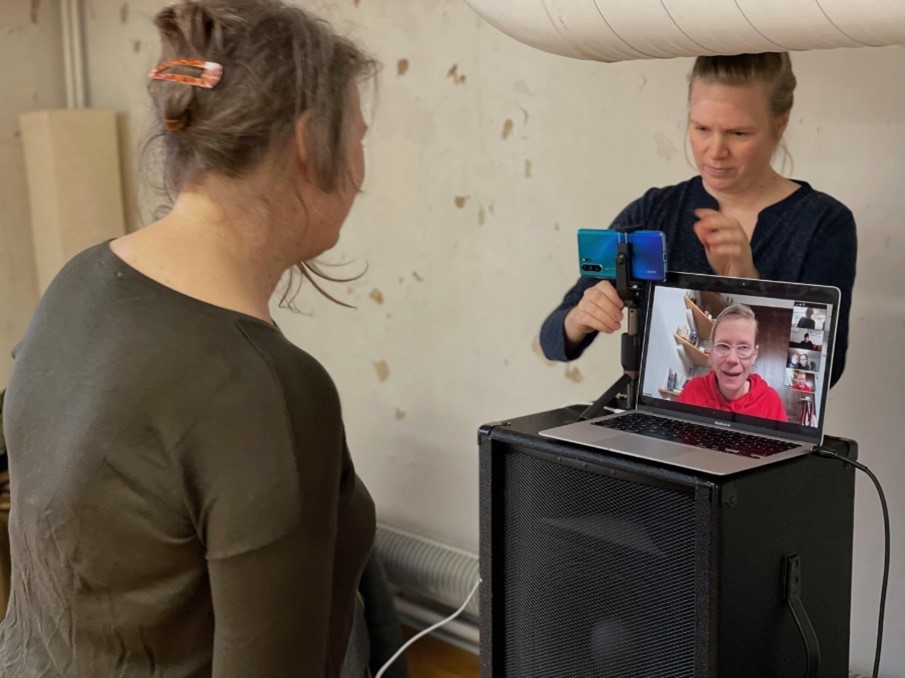
28.05.2021 – Oblivia Production Diary 2
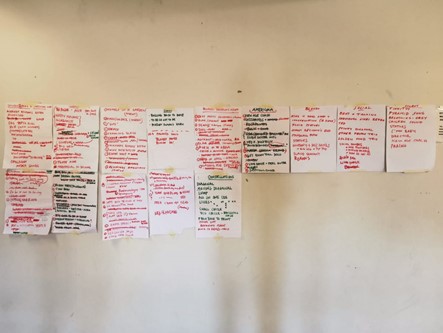
Annika Tudeer writes:
Different ways of writing. Loads of writing. Writing as part of making sense of the growing understanding of what we are dealing with. Here are some examples. The famous lists on the wall in the material gathering phase, but also some more intricate underlying texts. In the Obsessions process we have seen new sides of each other. Tua Helve is revealed as the poet in the “on the spot” process of writing that we have been doing together.”
Tua Helve
Obsessions haikus and tankas
My obsessions linger between
exhaustion and
how did they say it
Luke-warm intensely nothing
Inconvenience in a lame way
Show myself in a
new font round but light
Read me this way as I feel
Why does it become
so pathetic so easily so
Why where is the joy the strength
the busy prickliness and breeze
Tease out the marvel and bow
Obsession I pity you
you bore me we travel and die
unpack iron clean and go
Exercise, excel
ex All obsessions marching by
Change me if you can
Cherry-cake fake flight
quiver in the springy fresh air
Fair enough, faint away
Do your trick and don’t come back
Rain down now, then dance
Passion Fashion Wine Sex Lust
Looks Appearances Flashy Mag Girl
Never stop More Always More
Doesn’t go further why so Stop
Must be broken the system sucks
16.04.2021 – Oblivia start their “production diary”.
For a longer time, everything will stand still around the further development of “Kitesh”. But the project “Obsessions” in Helsinki is already getting underway. Today Alice Flerl published the first entry in the new “production diary” on Oblivia’s website:
“From our first online rehearsal period in the beginning of December 2020. As no travelling or gatherings were possible at this time, most of us were working from home, some were in the studio sometimes. Each of us made up a task for the others on each day, the next day we would share them.”
Task:

Answers (from Meri):
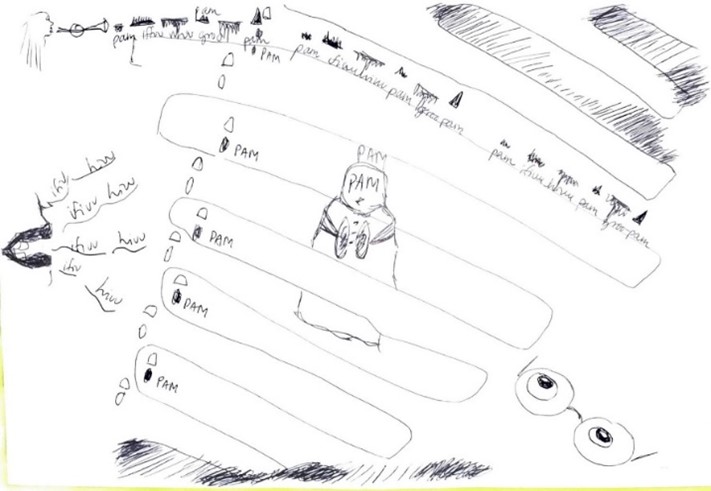
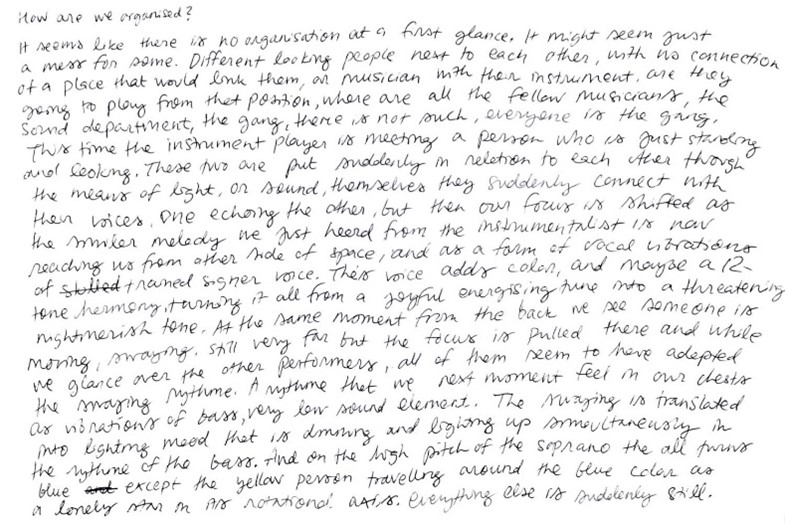
“Materials like these”, writes Alice, “were used for further development in our next online-rehearsal session in January2021: to create sounds, movements, ideas for stage design and costume.”
03.03.2021 – NOperas! enters a new round. Bremen and Gelsenkirchen are taking part
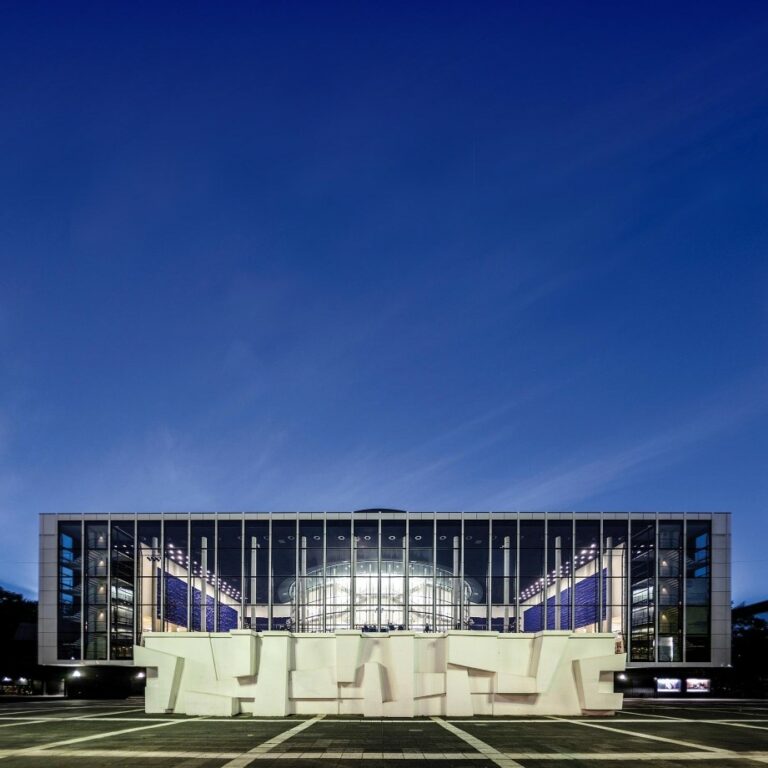
Yves-Klein-Himmel über dem MiR (© MiR Pedro-Malinowski_Quadrat)
Two theatres will be involved in NOperas! in the 22/23 season (a third may join in next year). The Bremen Theatre, which is planning its fourth NOperas! production, will be joined by the Gelsenkirchen Musiktheater im Revier. It is a very good acquaintance. In 2006 the feXm realised Lucia Ronchetti’s “Der Sonne entgegen” with it, then in 2017/18 the five-part project “ingolf” by Daniel Kötter and Hannes Seidl. “ingolf #3”, in which there were no actors other than the visitors themselves, later toured several independent venues in Germany and can still be found here on Youtube.
There is a production backlog everywhere. “Kitesh” had to be postponed in Bremen until the following season, when “Obsessions” is also scheduled to premiere there. We discussed for a long time whether NOperas! should even launch a new call for proposals in this situation, before everything that had been postponed had been worked through. But the independent music theatre scene has had two hard years. When it finally starts performing again, it will have to consolidate itself anew. It would be a fatal sign if, at this moment of all times, the only funding programme that exists for them were to be suspended for a year.
01.01.2021 – Theatre and digitality

War das in diesem Jahr nun eigentlich illegal? (© Roland Quitt)
Corona, that much seems clear, will keep us in suspense for some time to come. The feXm is also tapping its way into the year twenty-one with uncertain steps.
After almost every forced postponement has been followed by another one, almost all stages are now only driving on sight and hardly plan any further than for the coming days.
NOperas! has to live with this – in January it was supposed to go up, Hauen & Stechen and Oblivia would have met in Wuppertal. But now final rehearsals of the one and first workshops of the other have been postponed.
What will music theatre look like when we see land again? To wean the audience off its new fixation on Netflix, there will probably be Traviatas and Magic Flutes up and down. Still a few bold experiments, though?
The year 2020 has led musical theatre down unforeseen paths. Many ended up in the digital, including that of “Chaosmos”. After its premiere on Nachtkritik, “Chaosmos – the film” can still be found here on our website. Divided into a series of individual clips, this cinematic version includes the possibility for everyone to put together their own version. It is thus just one of the many current examples of how the principle of the interactive, which has increasingly flowed into theatre from digital media in recent years, is now returning to the digital in new ways designed by theatre-makers.
If it is the necessity of closed venues that has led theatre-makers into the digital space in the past year, Christian Esch argues in an article worth reading that this should not be understood solely as a forced retreat, but also as an opportunity for a new theatre. Doesn’t theatre, by renouncing the physical co-presence of performer and audience, forfeit precisely that which has always made it special among the arts, the strange double character of a conundrum constantly shimmering between illusion and materially authenticated reality? It is a kind of twist of mind that the performer and the performer put us into on stage, and they only create it on stage. Even where digital space functions in real time, it can never generate the strange double reality of theatre because it lacks the material counterpart to ground and counter its illusion, to lead into a game of challenging entrenched notions of reality. The “now” cannot be separated from the “here” without loss. It is this double reality that gives rise to the special utopian potential of theatre art – a at-one-ness and at the same time a tension and discrepancy of our authenticated and possible further worlds.
Magic Flute and Traviata notwithstanding, it is to be expected that audiences will still feel all this, and that they will therefore follow us in the end (some people worry about this rather unjustly) when they return to the venues. But there can be little doubt that the digital experience will have changed theatre. This will hardly be a return to the status quo ante.
22.12.2020 – Hyvää Joulua – 圣诞节快乐!
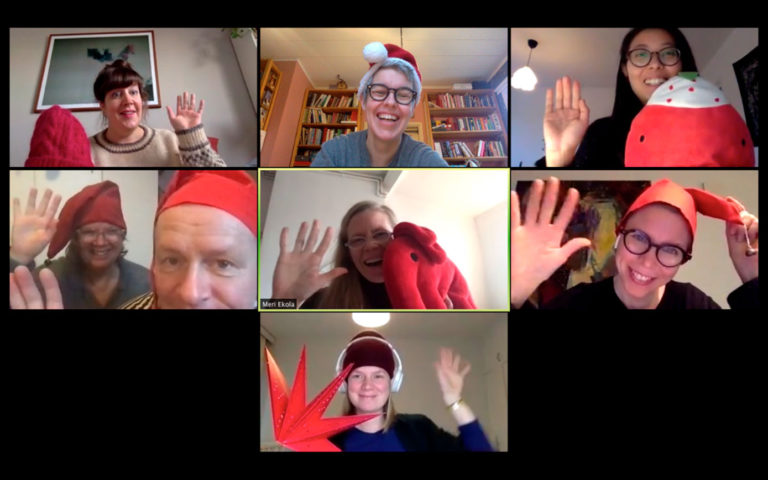
Helsinki, Stuttgart, Essen: Christmas-Obsessions
In music theatre, even contemporary productions are still used to rehearsals being solely for rehearsing. NOperas!, however, provides for rehearsals before there is a finished template, and that a theatre project (it is more about projects than “plays”) itself only takes shape in the rehearsal process.
The production teams are therefore allowed not only longer rehearsal time than usual, but also the option of spreading the duration over separate periods. Not all teams make use of these options – for Oblivia they remain substantial.
At each of the participating houses, two separate workshop phases are initially planned before the actual rehearsal period. A first one was scheduled for January. Due to the pandemic, it is not known when it will take place.
In addition, there will be trial phases, which will be conducted by the performers of the group alone. They are based on the group’s own improvisation techniques, through which the scenic material is developed.
Oblivia have started this work. It was to take place at Oblivia’s rehearsal centre in Helskini. Alice Flerl, a German member of the group, and Yiran Zhao, who also lives in Germany, were supposed to come. Of course they couldn’t.
They now improvise together digitally – the Finns in their studio, the others connected via the internet. We all had to learn how to organise meetings via internet platforms by now. But impro sessions? “I must admit, it’s not easy,” says Annika Tudeer.
The Oblivia doesn’t seem to have spoiled the Christmas mood.
15.12.2020 – Wuppertal: New plans for “Kitesh”
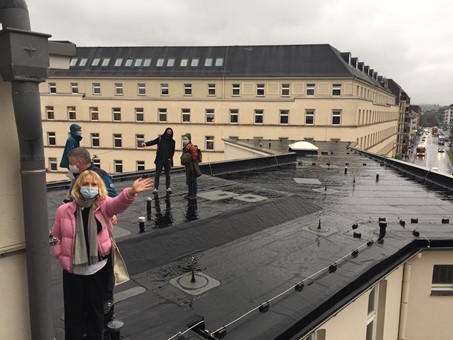
Spielort für Kitesh? – 15.12: Hauen & Stechen auf dem Dach des Wuppertaler Opernhauses. (© Franziska Kronfoth)
Already at the Kitesh performances in Halle, the audience and performers had to struggle with cold feet. A substitute had to be found after one of the singers caught a bad cold during the dress rehearsal. This is everyday life in the repertoire business, but still a nightmare for every premiere.
The team also got cold feet when it came to the continuation of the production in Wuppertal, which was planned for the coldest part of the year. Everything was rethought with a view to January. The decision was made to move the previous outdoor scenes to the interior of the Wuppertal Opera House. The theatrical penetration and re-evaluation of the urban space – one of the strongest elements in Halle – seemed a necessary sacrifice.
Corona then laid additional hurdles. Hygiene restrictions caused one after another of the indoor spaces to be cancelled. Too few remained as playable. But before it came to worse compromises, Corona – irony of the pandemic – then also wiped the January date off the table. Like everything else in the theatre, this date cannot yet be confirmed as definite, but the planning is now for June.
So once again we had to rethink. Cold feet in June? The urban space is available again!
It is different from Halle and needs new ideas.
Many of them were born on 15 December when the site was finally explored in more detail.
Has a theatre project ever experienced so many forced concept changes?
23.10.2020 – Halle: Premiere “Kitesh”
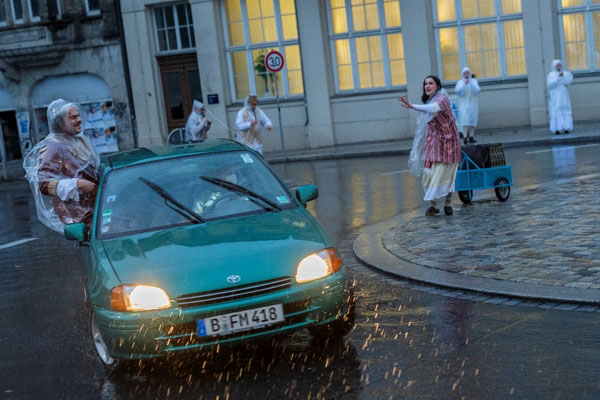
Nur bei der Generalprobe, von der dies Foto stammt, regnete es noch. Die akrobatische Szene im Kreisverkehr ist Teil der Halleschen »Kitesh«-Version, in Wuppertal und Bremen wird es sie nicht geben. Im Wagen Martin Gehrke, auf der Insel Gina-Lisa Maywald. (© Falk Wenzel)
Every NOperas! production confronts the participating opera houses with unusual challenges. That “Kitesh” would hardly stand back was clear from the beginning, but not that Corona would step in and take everything to the limit. After a strenuous hurdle race last Sunday, “Kitesh” had its premiere in Halle.
Two performances were played on this day of the premiere. Only seventy-five people were allowed as audiences in each case, which could not be heard in the thunderous final applause. Not only did “Hauen und Stechen” achieve something superhuman on the last stretch of the preparation, but also – with all its departments – the Halle Opera!
After the austerity programme of the digital space into which the theatre has retreated in recent months, after all the 19-inch formats in which it has been staged since then, “Kitesh” can be experienced as a circus-like spectacle that sweeps the audience away into the long forgotten world of exuberant total theatre and thus as an almost defiant act of insisting on a sphere of the sensual and immediate.
With the disappearance of the invisible city of Kitesh, the nmz (Neue Musikzeitung) sees at the same time “a happening celebrated about the disappearance of the opera. Not only of the concrete work from the beginning of the last century, but of the whole genre.” And it continues: “What [Hauen und Stechen] attempts to unleash in theatrical violence comes close to the work of art-the aesthetic of the future, which at the Halle Opera has controversially stimulated the discourse on the possibilities and limits of music theatre […]. But this […] series and its parts always remained in the small form appropriate to it.”
Now at least Richard Wagner, who coined the term “artwork of the future”, is not exactly known for his preference for small forms. Instead, he believed, it was a matter of “thinking the borders [sic] to the widest possible extent to be extended” (Wagner KdZ, Leipzig 1850, p.33). To do this, he said, one must “first examine the nature of the types of art which today, in their fragmentation, make up the general art system of the present day”, in order to then combine them into a “large, general work of art” [Wagner, p.36].
It can easily be argued that music theatre as an art form has always (and not only with Wagner) aimed at integrating all the individual arts existing at the time. It is therefore worth considering whether this evening in Halle was perhaps less about the “disappearance of the opera” than about a new revival of its innermost ideas.
Here is the link to the nmz article: www.nmz.de/online/todesvogel-und-blubblub-kitesh-an-der-oper-halle
14.10.2020 – Halle: Main rehearsal “Kitesh”
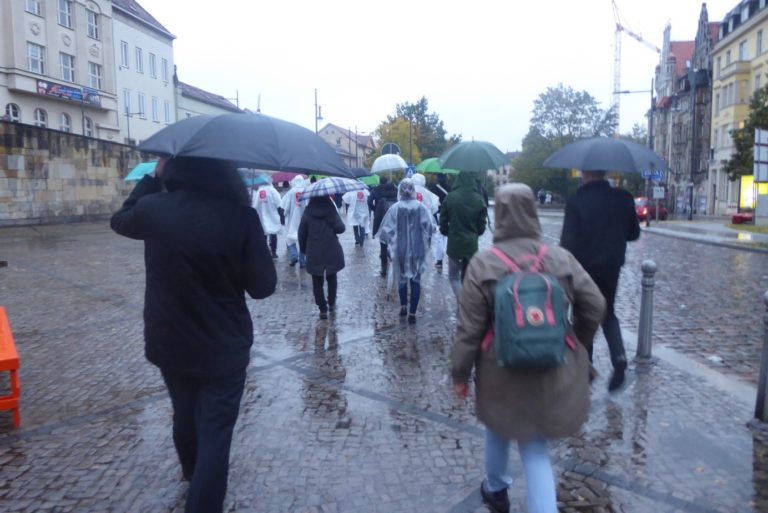
Glücklich konnte sich schätzen, wer in Gummistiefeln kam (© Roland Quitt)
Neither poncho nor umbrella could protect at last. The main rehearsal of “Kitesh” didn’t fall into the water, but quite a lot of water fell on them in icy temperatures before the course around the opera house led into the dry. Thanks to Corona, the performance can only last one hundred and five minutes. By about thirty minutes it was still too long at the end. Kill your darlings! A few beautiful scenes will never see the light of the theatre. Only the trial audience of the main rehearsal will remember them, wet feet were not too high a price to pay.
23.09.2020 – NOperas! is also back from the summer break
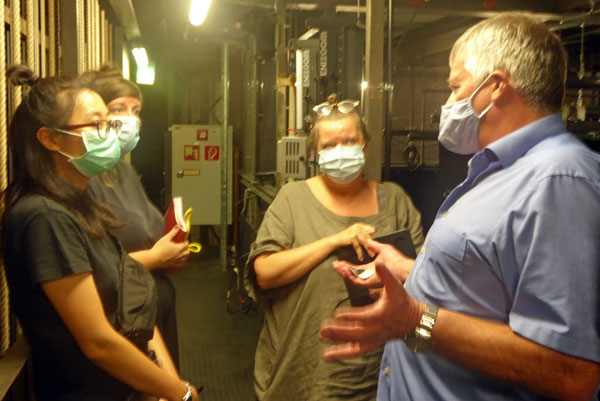
Im Bühnenturm der Oper Wuppertal: Yiran Zhao (Komponistin), Alice Flerl und Annika Tudeer (Oblivia), Mario Engelmann (Technischer Direktor) – © Roland Quitt
“Operation Warp Speed” (Captain Kirk sends his regards) is the slogan in the USA since yesterday. By all means, Trump wants to give his country a vaccine before the election. Putin promises to be even faster, but his laboratories are considered to be sufficiently reliable in the field of toxins.
The theatres are back from the summer break, back from the corona misery. Precisely because the situation has changed little in the meantime, it is no longer the same as before. The longer the virus keeps us in suspense, the more the view of it changes. And just as it is still impossible to travel through wormholes, with all this it does not look as if we will soon be back in more secure or manageable conditions.
In the theatre, too, this is now getting on our nerves. Intermediate solutions are no longer sufficient when the exception has become the rule. With its notoriously cumbersome structures, the music theatre business in particular is paralysed by the question of where it should orient itself and how it should plan.
NOperas! is also groping its way forward on this uncertain terrain. The word “experiment”, which the feXm carries in its name, has unintentionally acquired a second meaning. After “Hauen und Stechen”, Yiran Zhao and the group “Oblivia” are the second team this season that is mainly made up of women.
“Obessions” is due to have its first performances in Bremen, but the first working meeting last week was held in Wuppertal. It was a test of patience to organize it, there were constantly further cancellations of flights from Helsinki. With less arrangements in their pockets than usual, they went home afterwards. The basic uncertainty about the conditions under which theatre will be performed in a year’s time keeps Wuppertal’s schedule in abeyance. After all, the recent premiere of a “Zauberflöte” (The Magic Flute), which (apart from the limited ticket sales) did not allow Corona compromises to be seen or heard, is giving an emotional boost: at last, you can feel the theatre floor under your feet once again.
At the same time as Corona, the audience in Halle has to struggle with further complications. After the internal dispute between the artistic director and the commercial manager, both are no longer at the theatre, which is provisionally managed by production manager Maximilian Grafe. “Kitesh” – in its reworked so-called “Corona version” – is only affected by all this to a limited extent and is moving quickly towards the final rehearsals. Ticket sales for the three double performances in October are extremely limited. If you don’t want to wait for the further developments in Wuppertal and Bremen, you should quickly switch now.
Two productions are to be in progress in the NOperas! framework, one in the pre-planning stage and a second in the rehearsal and performance stage. According to such planning, “Chaosmos” would have been completed by the summer. However, after Corona led to the cancellation of rehearsals in Halle in spring and rehearsals in Bremen could not even begin, this production is still in progress. So there are three of them NOperas! is juggling with right now. Like many other theatre projects of the past season, “Chaosmos” also switched from stage to digital. The material is in the final stages of post-production. The final decision is still pending as to whether it will be presented as a coherent film or as a collection of individual clips.
06.07.2020 – Halle: Pre-rehearsals “Kitesh” start
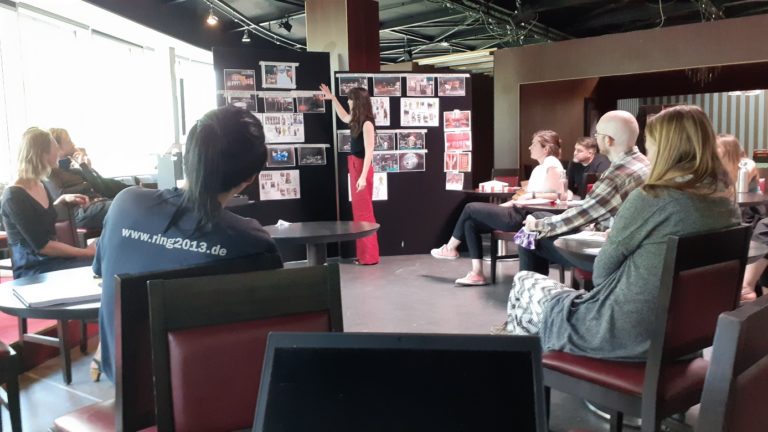
Konzeptionsprobe »Kitesh«, aufgrund der Abstandsregeln im Hallenser Operncafé. Sämtliche Gewerke des Hauses sind erschienen. Sänger*innen der Oper Halle begegnen zum ersten Mal denen von »Hauen und Stechen«. An der Pinnwand: Bühnen- und Kostümbildnerin Christina Schmitt. (© Roland Quitt)
It is already clear how much Corona will change the form spectrum of the theatre.
Due to hygiene regulations, “Kitesh” now had to be completely rethought and redesigned in essential points. Only 75 spectators will be allowed per performance. Instead of the originally planned three-hour performance, there will now be two performances of 1 ½ hours each evening, so that at least 150 people can be reached. Together the audience should be led through a parcour of several outdoor locations, but this will also not be possible due to distance rules. Three groups of visitors will now walk separately through these outdoor locations, each in a different order. Logical conclusion: Instead of playing one after the other, these sites must now be played at the same time, which considerably increases the personnel costs. More singers, more musicians and more support staff will be needed for all this. The participating theatres have agreed to this additional effort. What they cannot cushion themselves will be absorbed by the feXm. Kunststiftung and KULTURsekretariat mobilised the necessary funds and increased the amount of funding by 20,000 Euro. In fact, on July 6th, the planned week of preliminary rehearsals will take place, which was recently called into question due to weekly changes in hygiene regulations.
23.06 and 30.06.2020 – The third round is now underway
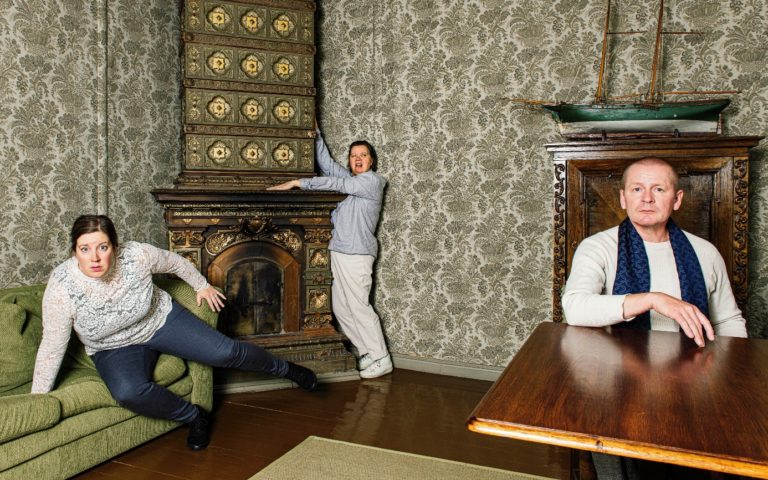
Neues Team: Theatergruppe Oblivia (Foto) gemeinsam mit der Komponistin Yiran Zhao (© Saara Autere)
Five applicants were selected by the feXm jury as finalists for the third season of the NOperas! programme. On June 23rd they will have an in-depth interview with the jurors in the new domicile of the NRW KULTURsekretariat. For most of those who came to Wuppertal for this event, it is the first trip after a long time. Each team had the opportunity to meet with the participating stages beforehand in order to further specify their concept if necessary. Until the evening the jury has not come to a clear decision, an additional meeting (via internet) for the coming week has to be arranged. There the decision will be made. The sponsored project of the 21/22 season is called “Obsessions”, the sponsored team is the theatre collective Oblivia together with the composer Yiran Zhao.
Oblivia was founded in Helsinki in 2000. The group has made a name for itself throughout Europe with performances that address major themes with minimal theatrical means. Yiran Zhao comes from China and has studied with Carola Bauckholt and Caspar Johannes Walter, among others. In addition to the performative, her musical work often incorporates visual media.
In the context of her first joint work with Yiran Zhao, Oblivia ventured into the terrain of music theatre for the first time last February. “Obsessions” continues this collaboration, but now also includes the ensembles of two municipal theaters in addition to the members of the group. Oblivia wants to work with different means on each of the two stages, two separate variants of a theatrical sweeping blow to the motif of the loss of rational control are to be created in this way. The extent to which the theme “Obsessions” plays into the social realm is obvious. As a leitmotif, however, it also runs through the history of music theatre: it forms the basis of the Opera Seria, continues in the Romantic Opera and extends – with “Salomé” and “Lulu” – right up to the phase of the last classical opera works.
26.05.2020 – Halle, Wuppertal, Bremen: Update
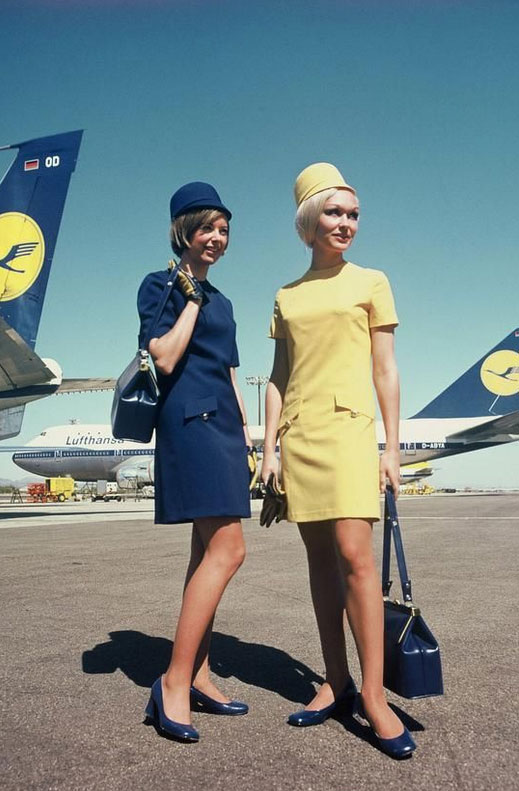
Was gibt es nur immer nur meckern an der »Grundsicherung«? Wird sich die Soloselbständige eher fürs gelbe oder fürs blaue entscheiden? Neun Milliarden ( 9 x 1.000 x 1.000.000) hat der Staat heute der Deutschen Lufthansa zur Verfügung gestellt! (© Wiki Commons)
Students of drama studies will at some point look at how we (and that doesn’t just mean the feXm, of course) tried to rock the theatre through this strange time. We will then be able to foresee what traces and changes it left in it, how it changed and possibly renewed itself, which of its earlier ways and methods remained obsolete afterwards. One will know what remained of him, how much of him remained, who remained of him.
Marc Sinan already posted it on Facebook last week: “Unfortunately, it is sadly certain that even ‘Chaosmos’ can no longer take place this season at Theater Bremen due to Corona. “It is already foreseeable that the German Language Society will declare this expression as their “Word of the Year” due to corona.
For “Chaosmos” this does not mean a premature end. Whoever takes part in the NOperas! program is prepared to understand that a project status achieved in each case is the starting point for further development. Inevitably, this further development also leads “Chaosmos” into the digital world. A stroke of luck remains: Unlike the many who have to earn their spurs in this field, this team is as at home here as on the theatre stage anyway.
Thoughts have been pondered and methods have been explored since January to find ways in which a theatre audience could become even more involved in the events on stage. Admittedly, all that was definitely a waste of time. However, the digital product is now also to become interactive in orientation to the original basic idea. The feXm has also held on to the fact that the theatre, where it doesn’t have to be, is not completely sacrificed to the home show on the PC, i.e. that on the basis of filmed material in Bremen and Halle there can still be forms of a performance in which singers are involved.
The will not to let the corona get you down is demonstrated by the clips that Konrad Kästner has posted on an interim basis in social media and (under the menu item “Media“) on the NOperas! website. His last one, recorded in the empty Halle opera house, was quite spooky, though, and seems a bit like a remake of Spielberg’s “Close Enconunters of the Third Kind”.
The course for “Kitesh” has hardly been set in a similar way. Although every state is currently following different rules, at least everything points to the fact that all theatres will be able to play again in October. But what will the conditions be? “Kitesh” won over the feXm jury with the idea of leading the audience through different stations of a common course one after the other. According to an adapted idea, these stations could be played simultaneously, with visitors divided into small groups. If, on the one hand, it can be assumed that even with such an adaptation there is no way around a considerable limitation of the total number of spectators, on the other hand, the number of participants will increase considerably, since now it is necessary to play everywhere at the same time. This remains an unsolved problem for the participating houses and for the budget managed by the group.
Not only wearing masks and washing our hands keeps us alive. It is part of the necessary mental hygiene not only to think manically about rescuing those in danger, but also to have the courage to plan something new despite everything. Last Monday, the feXm jury set the course for 2021 via an Internet conference, and NOPeras! will then enter its third round.
Finally, all website information for this call for entries was now also available in English. There is a clear increase in applications from other European countries. For the first time this year, the call for applications was also widely distributed among migrant and post-migrant cultural associations. But hardly any effect can be seen when looking through the applications. Is the idea of a music theatre, which, according to the wording of the call for applications, “in the field of a performative understanding of theatre, a questioning of the relationship between musical sound and space, language, theatre action and digital media”, possibly limited in its scope to certain circles?
Thirty-three teams have applied. Once again, it was extremely difficult to break down their applications to five finalists who were to be invited to an in-depth discussion. As the applications show, music theatre as a contemporary art form that goes far beyond opera is full of new and lively impulses. The feXm alone is hardly sufficient to provide the support it actually needs and deserves.
05.05.2020 – Halle: Masquerade
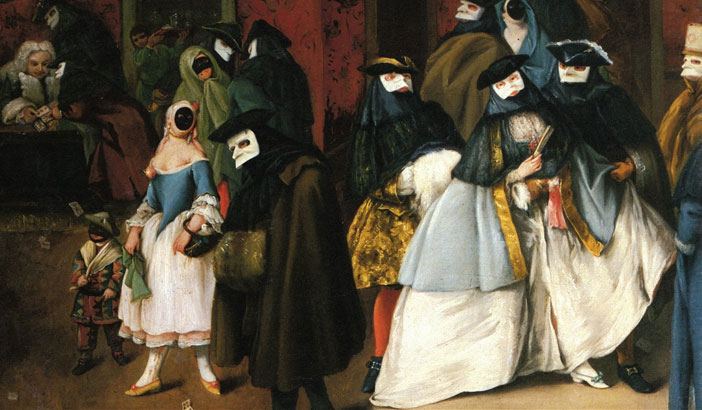
Am Aschermittwoch war alles vorbei früher. (© Unbekannter venezianischer Meister, 18. Jh.)
Display of a Halle pharmacy between the market square and the opera house: heads of twelve pretty mannequins present models of masks available here. Depending on the lifestyle concept and state of depression, there is a choice between cheerful colours that reflect the season and muted colours that reflect the current attitude to life. None of them yet bears the label Dior or Hugo Boss.
A laughing and a crying mask serve as symbols of the dramatic arts. A world upside down – not on stage but in the auditorium the mask will now experience its theatre renaissance.
Is that Florian Lutz there in some distance? As intended – everything looks a bit like a badly sold performance – the participants of the “Kitesh” rehearsal sit spread out over the half-dark auditorium, only the hairstyles above the masks give an idea of who is which. Names are called into the room, arms stretch out for recognition. Walkie-talkie of the technical director from the stalls while testing the angle of vision from the second tier: “How many are you up there?” – “Fifteen!” – “One downstairs, please. The rest of you, spread out.”
Everything is still so far from the ground that it’s hard to remember the situation of the day before yesterday, all planning for tomorrow is in the shadows. In order to be able to interact directly with the audience, the “Hauen und Stechen” team was still struggling with Bremen and Halle to limit the number of spectators – both houses (see blog entry from 06.04.) held on to the number of two hundred people. Due to the distance regulations, nobody expects more than one hundred to be allowed now. But the problem for “Kitesh” has hardly been solved: theatre that focuses on proximity to the audience will remain impossible for the foreseeable future. The deadline was too tight for “Hauen und Stechen” to be able to react to the new theatre situation. The rehearsal of the building on this day will therefore inevitably remain oriented towards a performance concept that does its calculations without Corona. A Skype appointment in the coming week will then deal with ways to adapt it.
10.04.2020 – Karlsruhe: Crisis management
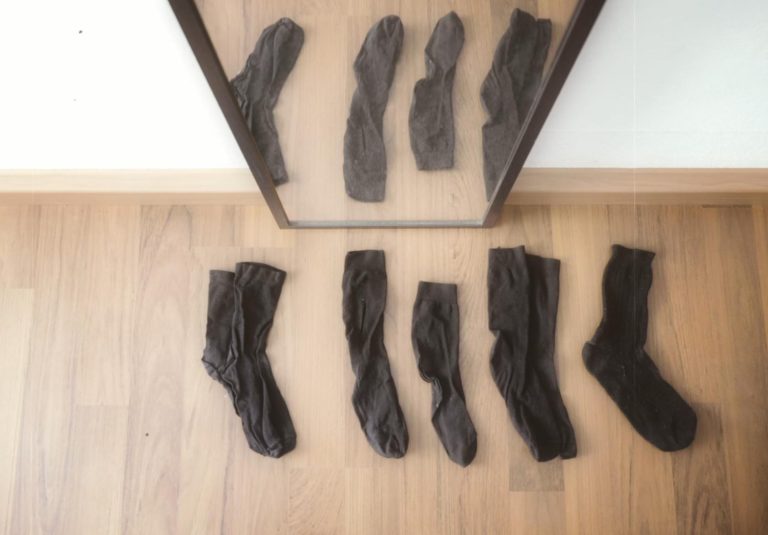
Auch Peter Stein war schon für seine schwarzen Socken bekannt.
Konrad Kästner’s research project “Das Material” was to have its premiere in Bielefeld last Friday. Until the rehearsals were cancelled and the cancellation, which, like many others, affected this theatre project, they were occupied with the miraculous self-reproduction of money in financial capitalism. In order to find out the secret, Kästner and his team gambled in the casino of financial bets and risk transactions – the stake, piled up from personal pockets, consisted of 100 Euros.
“It can’t be long before this collapses”, Kästner said, shaking his head, while still at the “Chaosmos” construction trial in Bremen (see blog entry of 29.01.) and meant less the profit he and his team had made until then than the financial system that made it possible.
However, pushed by a few bats in China, things went faster than expected and Johannes Kreidler’s composition “Charts Music” (the version by Ensemble Mosaik is recommended on YouTube), in which he – also a feXm artist by the way – musically set the general decline of the stock market against the simultaneous profits of Heckler & Koch in 2008, has found new relevance.
Not surprisingly, today there are also those who make money from this. Timo Klinger, twenty-four, from Sandhausen near Heidelberg, who until three months ago sold carnival articles – one could say that he worked in the cultural sector in the broadest sense of the word -, courageously changed his previous field of activity and secured several thousand breathing masks from China in January. By selling them on the net at thirty times the price he had previously sold them, he became a millionaire within twenty-four hours. Bridgewater Associates, on the other hand, hardly counts among the field of up-and-coming start-ups. As the world’s largest hedge fund, the company bet 14 billion dollars on the money market last week on the demise of Europe’s largest companies. But the manufacturers of toilet paper should not rejoice too soon. Their new products will pile up on the shelves for months if everyday life (will it?) should have returned to halfway normal at some point.
But what does a theatre director (Konrad Kästner) do, who has nothing more to do, since the theatre world has gotten into the greatest possible disorder?
He shifts to the compulsive substitution of order in his own rented apartment. For each of the three cancelled “Chaosmos” performances in Halle, the team wants to provide a small cinematic equivalent, this is the second and the link to it can be found → here.
06.04.2020 – Berlin /Halle: A brief media history
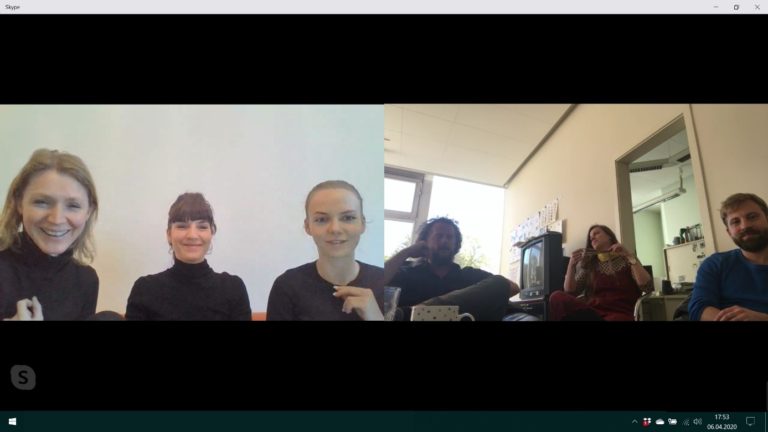
Rückkehr in die 1960er Jahre: »Cinerama«-Format und Split Screen bei der Bühnenbildabgabe von »Kitesh« (v.l.n.r.: Franziska Kronfoth, Christina Schmitt, Maria Buzhor, Florian Lutz, Ann-Kathrin Franke, Maximilian Grafe)
Does anyone remember the time when cinema was still produced mainly for the screen? After the recording process of the Cinemascope, the even wider “Cinerama” had been developed in the early 1950s. The idea behind these formats was to create a feeling of width. Inevitably, however, they were then drawn into the newer medium of television, where they created a rather claustrophobic feeling of unease: stagecoaches or Roman chariots – tiny, they chased along within a narrow strip of film surrounded by black bars.
Back in the days of Cinemascope, we seemed to be these days, since interpersonal relationships are only disembodied via the zeros and ones of digital communication, when the »Kitesh« stage set is given in Halle. And there, too, it was now, behind the scenes, mainly about questions of format.
Almost always over the past hundred years, the theatre’s developmental thrusts have taken their starting point in the intimate setting of smaller venues. Only here, where the actor and the theatregoer come close to each other in a small audience and a vibrant field of conflict between the real and the fictional arises, could – and perhaps had to – create a new aesthetic that, with the sophistication of illusion theatre, also pushed the separation of the spheres between artist and audience overboard, bringing the visitor into the play and understanding him or her as a participant.
But what happens when such a theatrical approach, as it remains decisive for Hauen und Stechen, encounters the machinery of the municipal theatre, whose architecture alone is already oriented towards a contrary idea and whose directors, halfway understandable, are still measured by their employers in terms of capacity utilisation payments?
For this reason, the houses of Halle, Wuppertal and Bremen still insist on two hundred visitors per performance at “Kitesh” – and that is quite a compromise. But it’s difficult for Hauen und Stechen to make the theatre under these conditions with which they have made a name for themselves as a group.
That’s why “Kitesh” still has the houses of Halle, Wuppertal and Bremen insisting on two hundred visitors per performance, and that’s a compromise in itself. But it’s difficult for them to make the kind of theatre under these conditions with which they have made a name for themselves as a group.
No more typical feXm conflict could be imagined. Two systems that have so far been incompatible, analogous to those used in the early days of cinema and television, collide here. As in the case of the film and monitor format (one less wide today, the other wider than before), city theatres on the one hand, and free scenes on the other, will be forced to take new paths, but this should not be a separation that fixes both on outdated patterns.
However, anyone who, thanks to all the current screening of historical performances and video transmissions from deserted auditoriums, follows the theatre of these days on their PC will learn that the stage here is like Peter Schlemihl, who sold his shadow. With rapid changes in location and the alternation of close-up and distant perspectives, film has become an art form in its own right, one that still has little in common with theatre. Unintentionally, all the compensatory performances with which the stages try to keep their audiences in line reflect above all the untransferability of the theatrical experience into the digital world and thus the full depth of the momentary loss. Not only must the speech and action of even the best stage performer appear hollow and exaggerated when they appear in a foreign medium. In reaction to the language of film, theatre also had to reflect on what it has ahead of film. The concept of the separation of audience and actor belongs to film today. However, no other art is so beaten by social distancing as that of theatre.
03.04.2020 – Halle: Aria in costume and mask
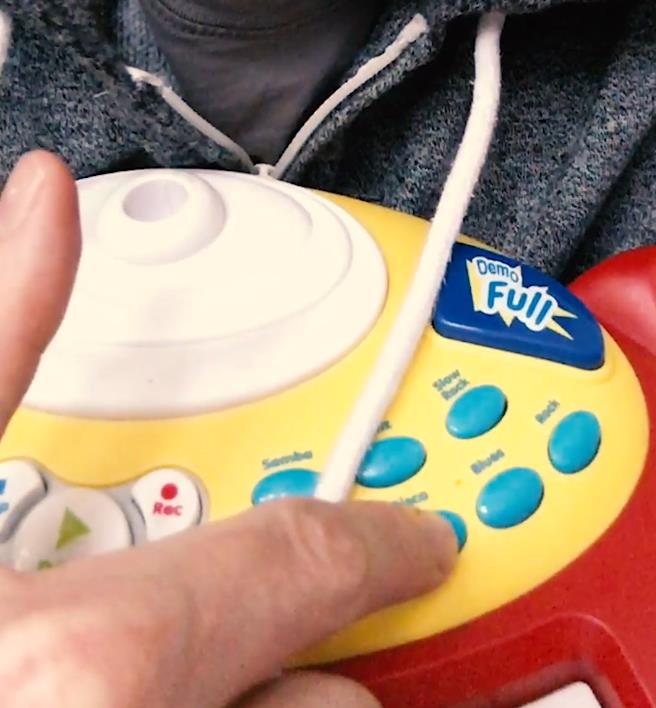
NOpera mit Fliegender Untertasse als Heimorchester (© Robert Sellier)
When will we play again? – It is difficult for theatre management teams to make halfway reliable plans as long as it is still unclear. Whenever “Chaosmos” takes place in Halle then, some might have studied their games for free. It’s hardly guaranteed that the original cast will remain.
That’s why you now have to let it melt in your mouth:
Robert Sellier, who studied the tenor part for Halle, did not put the notes aside even after the rehearsals were broken off. He continued rehearsing at home on his own. And he has sent a clip which, with its corona version of a complete aria by Marc Sinan, also includes the discovery of another musical theatre talent. We post this as a world premiere today, for which the “Chaosmos” premiere in Halle was announced. Whoever misses this clip is to blame. Here is the →LINK.
26.03.2020 – Shutdown

Düster: Sonnenfinsternis, Juli 2019 (© ESA)
It was to be expected after a few days: Cancelled, the rehearsals for “Chaosmos” in Halle. Like a hundred others, this premiere will not take place at the estimated time. Nevertheless, the wheel does not stand still at the theatres, even if their doors remain closed. Neither does the feXm.
Together with the production team, feXm and Oper Halle are looking for alternative dates for “Chaosmos”. Instead, the date has not changed, only the communication channel for handing in and discussing the stage designs for “Kitesh” – after all, internet conferences make it possible to look everyone in the face at the same time.
Whatever you move, you are still currently maneuvering on uncertain ground, and within an overall plan, every move involves a chain of subsequent shifts. That’s why the people in Halle are now thinking about ways to keep the date of the construction test for “Kitesh”. If feasible, it should be supervised by a minimal staff of stage technicians. The rest of the people involved could then be connected to the internet, the safest place to be at the moment.
During all this, the third tender for NOperas! has come to an end. Almost by default, a “Stay healthy” in the letters of application replaces the warm greetings of an earlier era. Either way, the plan remains that nothing should delay the evaluation of the applications.
When “Chaosmos” began to take shape months ago, who would have thought what food a reflection on systems of order would soon find. What went on in Wuppertal in January seems more topical than it was then and at the same time has to face new interpretations. The idea of the collapse of all systems has lost its remotely fictional character. Hardly any more comes across as a vision of liberation. “Chaosmos” deliberately leaves in limbo the question of whether criticism of systems of order should be directed at particular systems of their own kind or whether systems of order have always been systems of suppression in themselves, and thus fundamentally to be fought against, as is the standardized opinion of more recent fields of study that bear the word “post” as a prefix. Two months after Wuppertal, we now have a clearer idea of what can be meant by the word chaos, and we want nothing more than order.
Will a worse order emerge from the former one, one in which we soon get used to state rule? A better one sees a Dominican coming on the radio yesterday. He said that we were running too fast and too breathlessly after things. Finally the chance to find peace, to reflect on the real thing, as he says. But is there anything more real for the many solo freelancers in the independent scene at this moment than their concern not to make ends meet? What will happen with the funding that artists qualified for in the context of “NOperas!” and on which they rely for the lives of their families, should it really turn out that in the end many things will have to be cancelled and that in the long run postponements will lead to a backlog of new commissions? At the moment of the threat, the country seems to become more aware of what it possesses in those who are beyond the economic exploitation chain and provide it with culture. Even the feXm would not leave its artists alone.
Translated with www.DeepL.com/Translator (free version)
12.03.2020 – Halle: How to go on?
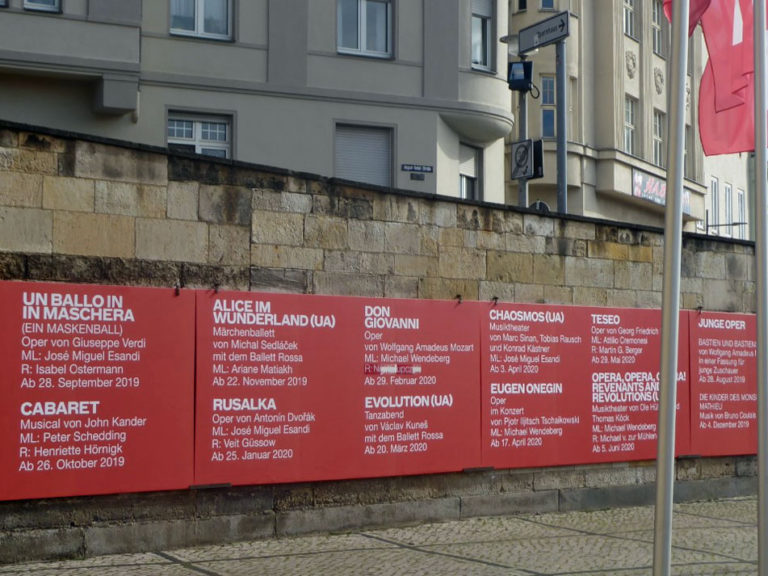
Ankündigung »Chaosmos« in Halle
Three days ago, concept rehearsal of “Chaosmos” in Halle: animated discussions that lead deep into the subject matter of the project – one rarely encounters such a precise interest in content on the part of the participants in the opera world. It was only three days ago and suddenly many things are in question. Corona has Germany under control. Theatres and cinemas in Berlin have been closed. Halle closed schools and children’s day-care centres today. And since noon it has been clear: there will be no opera performances until 27 March. Nobody knows what will happen after that. Three performances of “Chaosmos” are scheduled for Halle, two in April, one in May. Will they take place? The rehearsal work continues …
02.03.2020 – Halle: NOperas! falls in at the Saale
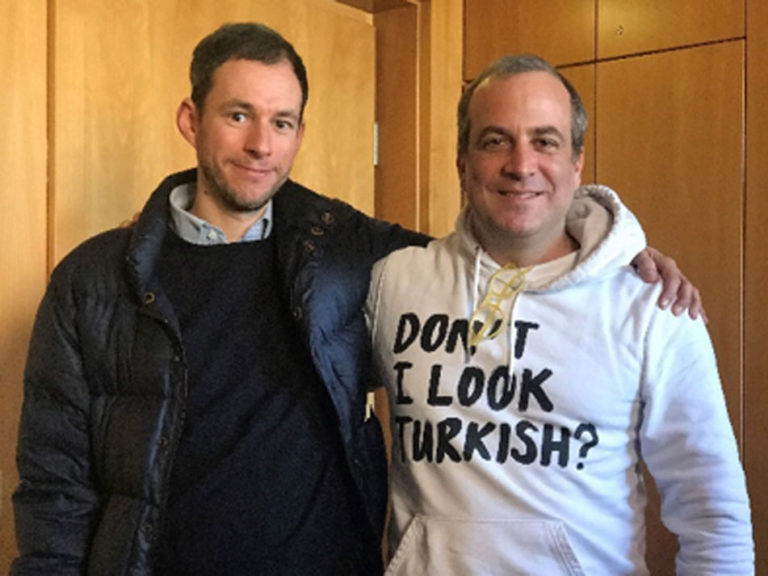
Gipfeltreffen neuen Musiktheaters im Pausenfoyer: Roman Lemberg, musikalischer Leiter »Kitesh«. Marc Sinan, Komponist »Chaosmos« (© Selfie)
The opera sets clear rules for the relationship between sound, language and visual events. Anyone who ventures into newer forms of music theatre, on the other hand, who starts from scratch, must first negotiate the most basic principles for himself anew. E-mails and telephone calls within the “Chaosmos” team still revolve around this topic. None of the art levels should be “obedient servant” anymore, for Marc Sinan the optimum has not yet been reached in Wuppertal, he wishes for thinning of the material and less overlapping of the information levels.
Like on the Wupper in January: NOperas! summit meeting now on the Saale. Composers and musical directors of two production teams cross paths in front of neighbouring rehearsal stages – for “Chaosmos” vocal rehearsals begin; for “Kitesh” it is a matter of preliminary coordination with singers in the complex process of the piece development that has begun.
Dull feeling of both teams on arrival, still the press reports about internal quarrels in Halle. However, both projects are then met with enthusiastic commitment. It is nothing new for this ensemble to try out the unusual.
An essential moment for the work of the feXm: the meeting of different horizons of experience – Andreas Fischer was engaged in Halle for the bass part of “Chaosmos”, he is a founding member of the Neue Vocalsolisten, and he brings to the quartet his rich experience in dealing with contemporary music.
This day will be a par force ride for the sopranos Anke Berndt and Yulia Sokolik, who are involved in both productions. Alexander Chernyshkov leads improvisations in order to get to know them in detail as vocal performers and then tailors his compositions to their individual needs. Roman Lemberg is also involved in the composition of “Kitesh”. Anyone hoping for a clear structure of the conventional distribution of tasks would have to despair even more when Lemberg explains the way H&S works: “That the vocal ensemble is also in demand when selecting musical material. That there is hardly anything like main and supporting roles at H&S. That the vocal parts will be clearly divided, but not beyond that the roles. That it must first be established who is playing which character at which moment … NOperas! has fallen in at the Saale.
15.02.2020 – Wuppertal / Düsseldorf: The third round has begun
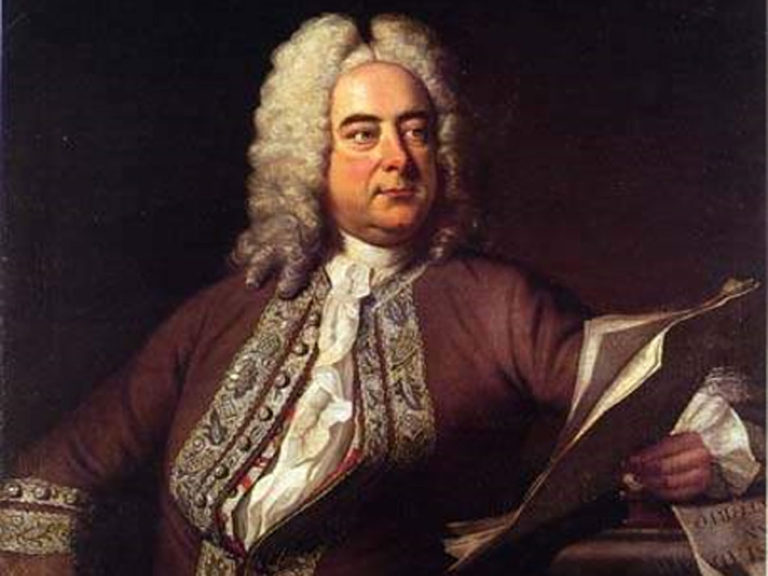
Not amused – auch er machte seine Karriere dann woanders. (© Archiv)
It has now been running for a fortnight – the third call for projects. New applicants have one month left.
The basic idea of NOperas! is that three theatres join forces for three seasons to do pioneering work together. But only two will be involved in the third season. Under Florian Lutz, the Halle Opera House has become one of the leading opera houses – but the supervisory board, which decides on the welfare of the theatre on the Saale, did not extend its contract. The city of Kassel, which immediately grabbed Lutz as the new director, perhaps even Lutz himself, who will now run a state theatre, can be pleased, but not unfortunately the Experimental Music Theatre Fund – Lutz’s non-renewal shortens Halle’s ties to “NOperas!”
29.01.2020 – Bremen: construction trial “Chaosmos”
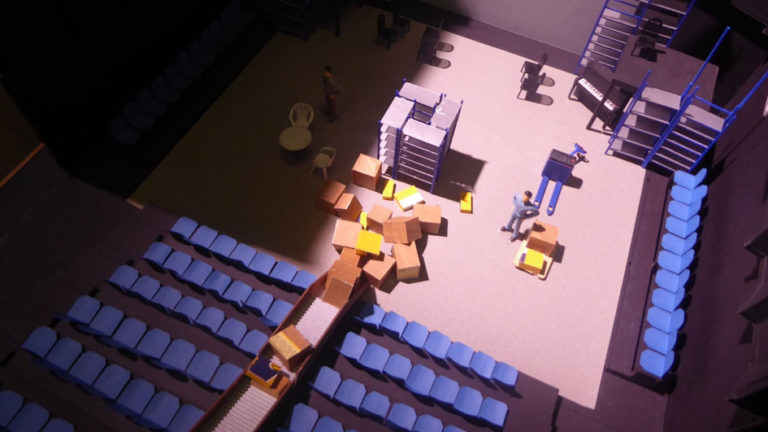
Beschluss: So wird es in Halle dann doch nicht aussehen
“Chaosmos” takes place in Bremen at the Schauspielhaus. As Eyleen König’s model shows: From the Wuppertal spatial stage situation, only a single row of spectators would remain here on the left and right. Anyone sitting there would have the feeling of sitting on the stage themselves. So it would be better to return to the usual here, to put the whole audience on one common side. On an extended slope, the boxes of the “logistics center” will therefore come rattling from far across the entire audience area.
24.01.2020 – Berlin: Work meeting “Kitesh
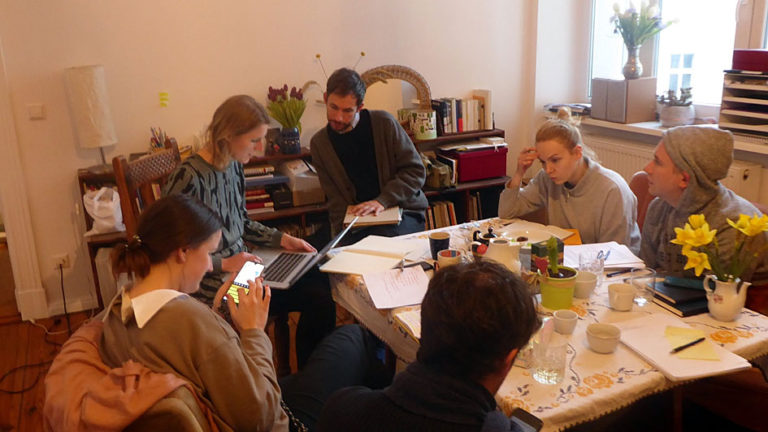
Altbauwohnung in Friedrichshain: Gina-Lisa Maiwald, Franziska Kronfoth, Roman Lemberg, Martin Mallon (von hinten), Maria Buzhor, Alexander Chernyshkov
Alexander Chernychkov has arrived. He is the only one who does not live in Berlin.
“Kitesh” is his second collaboration with H&S. Chernychkov’s sound world is intended to counterpoint that of Rimski. Roman Lemberg as musical director will simultaneously edit and re-instrument Rimski. Collective search of both for a touch of old and new.
H&S decidedly call themselves a “collective”. This is not only justified in the rehearsal process, but already in the early stage of idea generation. Already here the actors are also involved. The fact that the pool of ideas remains so full of conflict is not to be levelled out in the further process, it is one of the special features of the H&S aesthetic.
Rarely in free theatre work is there a budget as high as NOperas! makes it available. However, this is a project that should show different faces in different places. In the end, the financial resources are therefore hardly luxurious. (When and where can she meet with him for work without travel and accommodation costs already eating up too much?)
Flying change in Friedrichshain from first approaches to a basic dramaturgy, discussions about the term “utopia” and questions to be clarified in the organizational field.
20.01.2020 – Press review
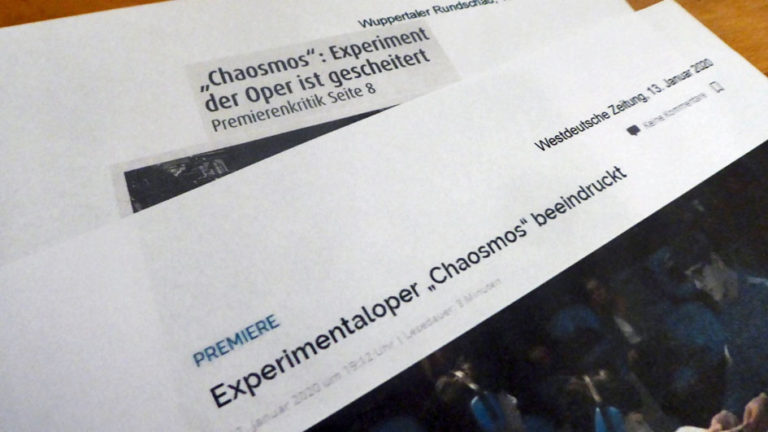
Good or bad – der Begriff »Oper« bleibt im Vordergrund
The press echo on “Chaosmos” was benevolent (with slips). Irritation in some people concerning the involvement of the audience – that is: their influence on the musical process. Indeed, some things here still remained misunderstandable. The word “opera” often appears prominent. Noperas! but is called NOperas! because it is about ways out of the narrow scope of the opera form. The ironic use of the word “logistics opera” is not immune to misunderstandings – also with regard to the music of Marc Sinan: she hardly wants to become the mistress of the theatre any more, she tries to fit in with the multimedia in an equal way (and quite far away from the opera).
11.01.2020 – “Chaosmos” premiere in Wuppertal
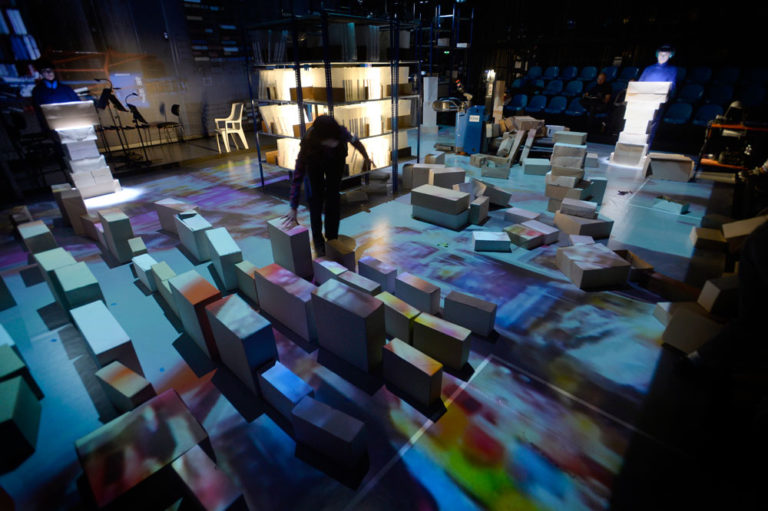
Chaosmos: System vor dem Kollaps (© Jens Grossmann)
The usual concern just a few days ago: How will the premiere be sold? But a lot of preparatory work for new music theatre formats has already been done in Wuppertal. Demand exceeds the number of seats, some have to postpone their visit until the second performance.
In Wuppertal, “Chaosmos” is part of a programme called “on stage”. Also otherwise the audience is brought on stage. Visitors should therefore be used to questioning the peep-box stage and its relationship between performer and audience. Nevertheless, some of them are sceptical about the fact that they are being brought on stage one person at a time, and are even entrusted with sorting out the notes before they are finally allowed to sit down. The audience shouldn’t have it too comfortable afterwards, either. Stage designer Eyleen König has banished him to stadium seats …
But then everything gets rolling. After ninety energetic minutes: Long and intense applause for soloists, musicians, production team. A bravo at this point also from the feXm: For Rike Schuberty and Annemie Twardawa as Joe and Jay. But especially for the quartet of singers and the musicians of the Wuppertal Opera. They mastered a lot of unusual things on this evening, synchronized in their interplay solely by a click track in the ear instead of a conductor.
For the feXm as well as for the production team, “Chaosmos” was initially an obstacle course. Some organisational adjustments were only made in the context of ongoing experience with the new support programme. But everyone’s sigh of relief now is short. Who else knows such premiere festivals? Little attention is paid to final judgments, most speak of ways of further development.
09.01.2020 – Wuppertal: Final rehearsal “Chaosmos” and working meeting “Kitesh”
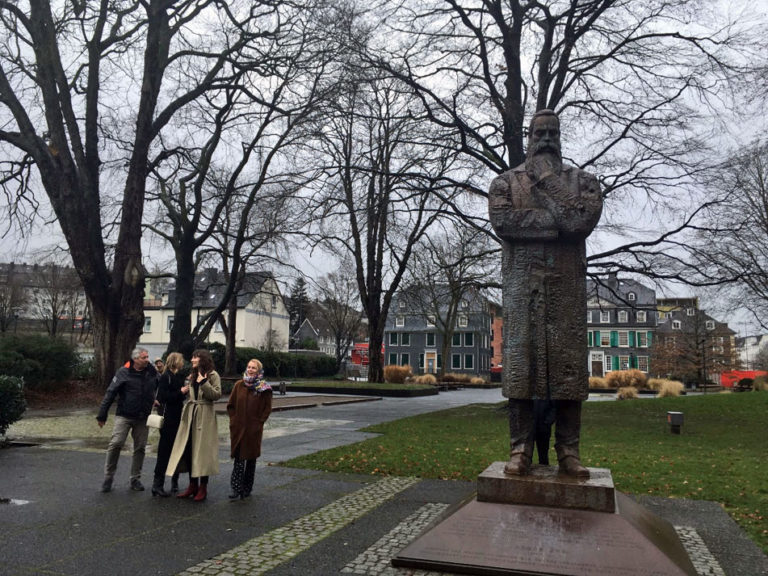
Mario Engelmann, Franziska Kronfoth, Christina Schmitt, Maria Buzhor, Friedrich Engels
NOperas! finally on a double track: “Chaosmos” and “Kitesh” meet in Wuppertal.
Final rehearsal “Chaosmos”. The management teams from Bremen and Halle arrive. After the extensive preparation time together: first view for them on a stage result, which should then go through further stages of development.
Theatre can always go wrong, even more so when it enters new territory like here. Then a deep breath of relief and a detailed pat on the back for all of us after the end of the run.
On site are also “Hauen und Stechen”: Mammoth meeting in the afternoon for “Kitesh” with the departments of all theatres. Arrangements about cast and organizational procedures should be finalized. Not easy. Each of the theatres brings different conditions into play.
Rimsky’s opera (The Legend of the Invisible City of Kitesch and of the Virgin Fevroniya) – in Russia it is part of the standard repertoire, but hardly in Germany. In this project, it is intended to provide the starting point for an examination of utopian thinking. Lay choirs won locally form an important part of the concept – it is about connection to the people of the respective city, also about the special aura of individuality and authenticity, which a professional opera choir can hardly provide.
Only after a longer course the performance should land in the house and on stage. Already in December H&S have explored Halle. Mario Engelmann, technical director of the Wuppertal Opera, leads the team through the opera house and adjacent outdoor areas. The parcour – the legend of Kitesch goes back to the Hunnensturm – will start in a tent. Where could it be set up?
In front of the theatre is the “Engelsgarten”. It does not have anything to do with angels, but with a Wuppertal textile entrepreneur whose birthplace is located here and whose name is not an unimportant one in the history of utopian thinking. Could one be more deeply involved in the work on “Kitesh”?
